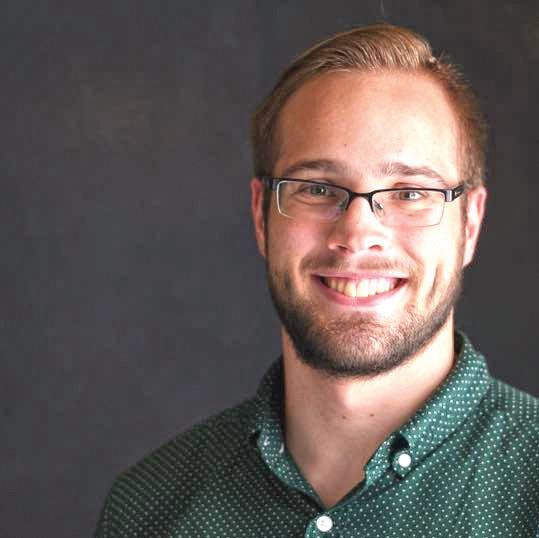
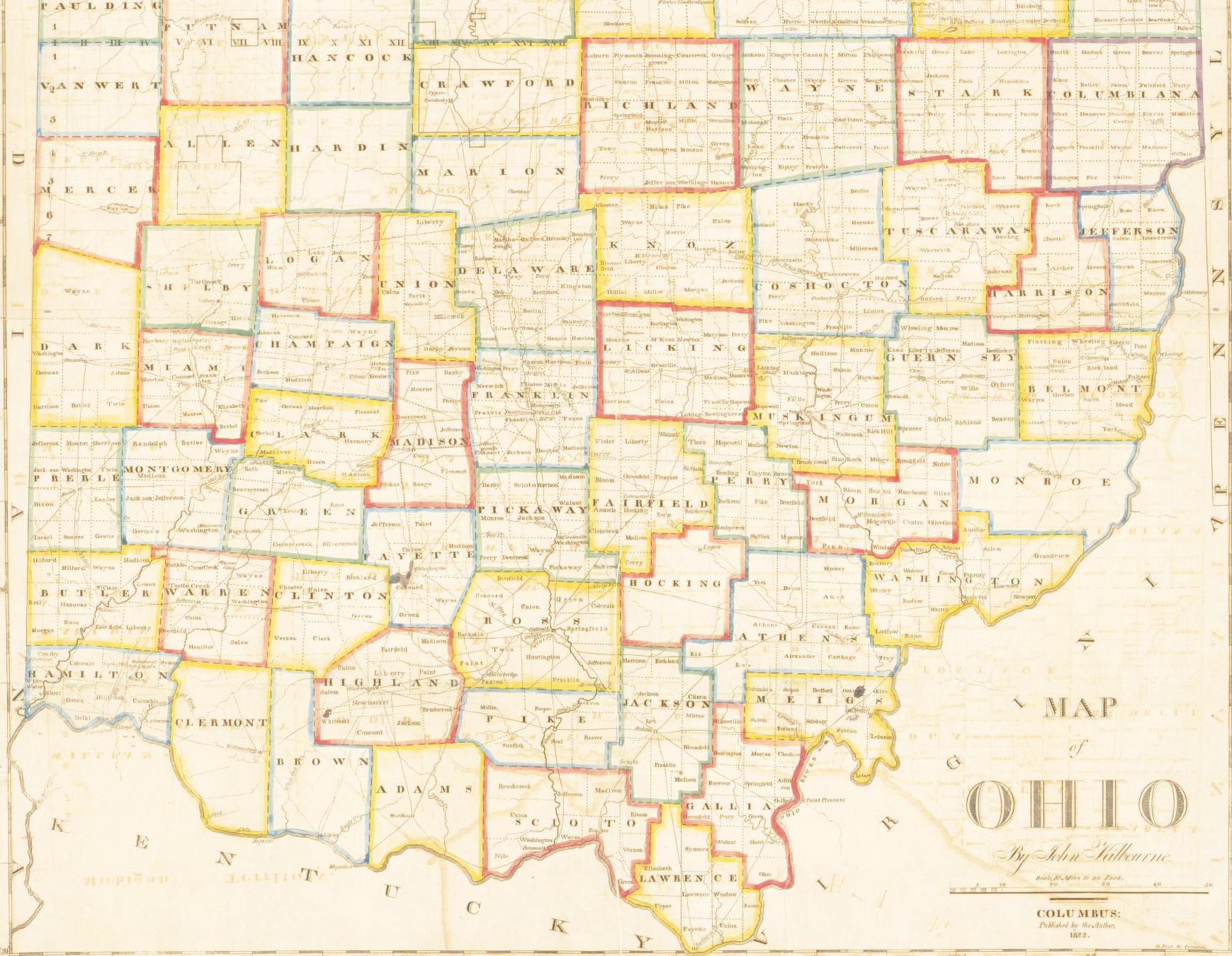


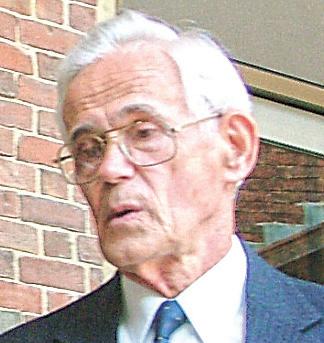


OBSERVER DAYTON THE Published by the Jewish Federation of Greater Dayton February 2023 Shevat/Adar 5783 Vol. 27, No. 6 David Moss designs Grace After Meals in comic book form p. 22 The Miami Valley’s Jewish Monthly • daytonjewishobserver.org A Jewish wedding checklist p. 20 Righteous Among the Nations dies 6 New Israeli govt.'s controversial proposed judicial reforms 8 Rodger Kamenetz on ChatGPT and the golem 26 Keeping histories of Ohio's small-town Jewish communities alive Austin Reid, author of 15 histories of small-town Jewish communities in Ohio, including the Upper Miami Valley and Greene County. Temple Anshe Emeth, Piqua, established 1858. LOC Jewish Federation of Greater Dayton 525 Versailles Drive Dayton, OH 45459 Address Service Requested NON-PROFIT ORGANIZATION U.S. POSTAGE P A I D DAYTON, OHIO PERMIT NO. 59 Marshall
Longtime
AI-generated golem image JTA PM
Kobi
Weiss
Tipp City resident Marinus Bosma
Benjamin Netanyahu
Gideon/GPO
Meredith Hoffheimer, daughter of Melissa and Philip Hoffheimer, creates a tree landscape in advance of the Tu B'Shevat holiday, at the Dayton Art Institute, which sponsored the family program along with Hillel Academy Jewish day school and PJ Library.
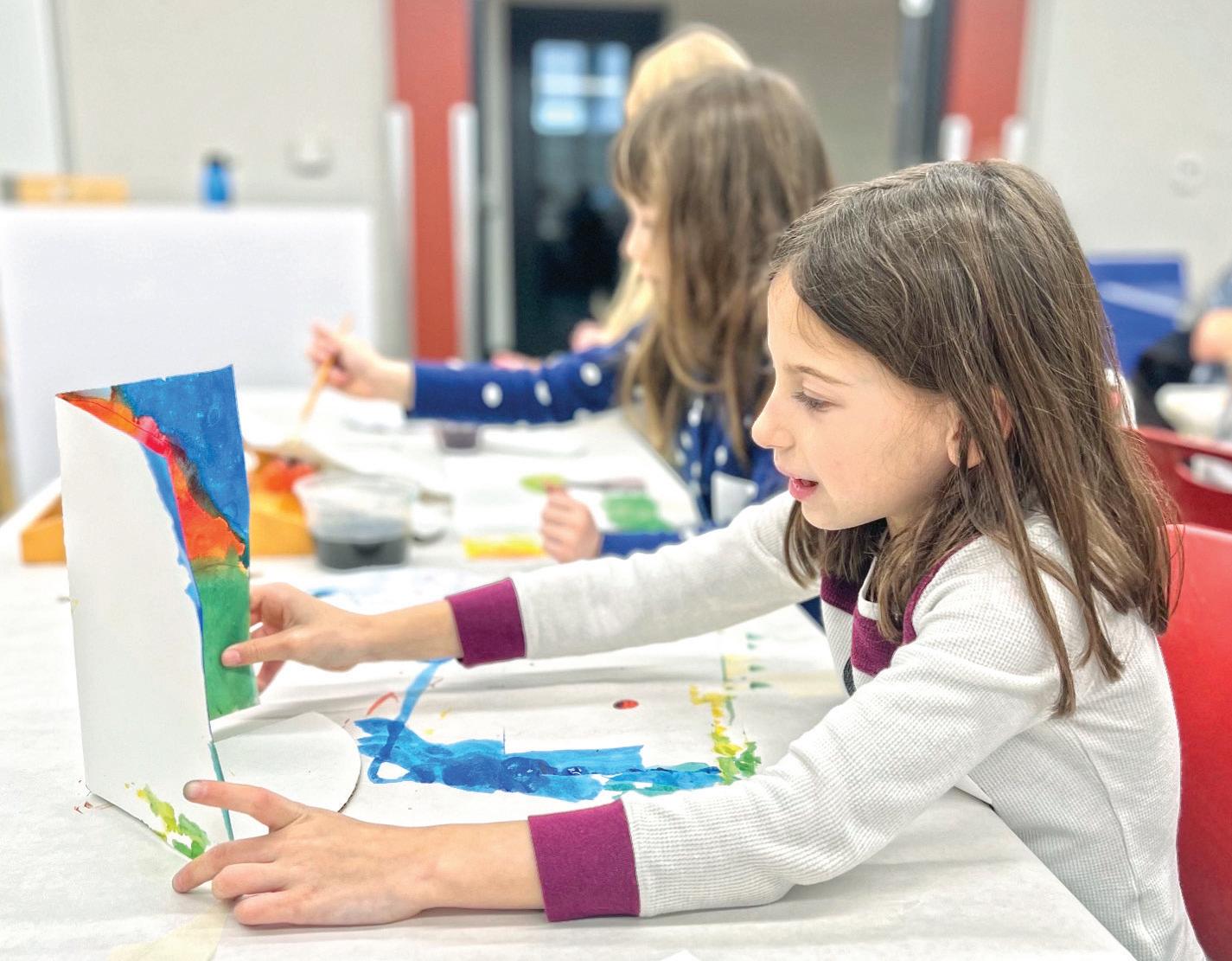
Financial Life®.”

Sabbath of Song events


In honor of Shabbat Shira, the Sabbath of Song, ethnomusicologist Rachel Adelstein will lead Beth Abraham Synagogue's Zoom session, Israel Goldfarb, Shalom Aleichem, and the Search for Nusach America, at 7 p.m., Thursday, Feb. 2.
Nusach is the Hebrew word for melodies used for prayers. Adelstein will talk about the origins of the tune to Shalom Aleichem familiar to American Jews, which Goldfarb first published in 1918. The Zoom link to this program is available at bethabrahamdayton.org.
The Dayton Jewish Chorale conducted by Anna Vinnitsky will perform a musical Shabbat service in honor of Shabbat Shira at 6 p.m., Friday, Feb. 3 at Temple Israel. The chorale is facilitated by Temple Israel Music Director Courtney Cummings and Beth Abraham Synagogue Cantor Andrea Raizen.

Temple Israel is located at 130 Riverside Dr., Dayton. To join the potluck dinner following the service, RSVP to info@tidayton.org. The cost is $5 adult, $3 ages 4 to 12, free 3 and under.
Shabbat Shira is the Sabbath when the Torah reading includes the song the Israelites sang after the splitting of the sea in the Exodus narrative.
Beth Abraham Synagogue Religious School students — (L to R) Lana Dorf, Benjamin Goorskey, Jonah Dorf, Jackson Berry, and Lucien Gabbe — wear prayer shawls they designed themselves for their prayer studies with Cantor Andrea Raizen. The students studied the commandment of tzitzit (fringes) and learned to tie them. The cantor took them on a field trip to a fabric store where each selected fabric for their prayer shawls. 'They decorated pieces that would be attached as the atara (collar) and the four corners where the tzitzit would be tied,' Raizen said. Younger children in the religious school received pillowcases to decorate that had the Shema printed on them as a reminder to recite the prayer as they go to sleep.

Tu B'Shevat celebrations
Temple Anshe Emeth will join Beth Jacob Congregation for Kabalat Shabbat and a Tu B'Shevat/ Shabbat dinner at 6 p.m., Friday, Feb. 3 at Beth Jacob, 7020 N. Main St., Harrison Township. The cost of the dinner is $18. RSVP to bethjacob1@aol. com.

Beth Abraham Synagogue will hold a Tu B'Shevat Seder during kiddush lunch at noon, Saturday, Feb. 4. Beth Abraham is located at 305 Sugar Camp Circle, Oakwood.
At 9:45 a.m., Sunday, Feb. 5, Temple Israel's Ryterband Brunch Series will present speaker Tara Poling, program director of the Marianist Environmental Education Center. She'll talk about the Jewish Bible's connections to today's environmental challenges. The cost for brunch is $7. After Poling's talk, Temple Israel's Adult Education Committee will host a Community Tu B'Shevat Seder at 11:30 a.m. Temple Israel is located at 130 Riverside Dr., Dayton. RSVP for the brunch and seder at 937-496-0050.

Tu B'Shevat, the New Year of the Trees, marks springtime in Israel.
Chabad Shabbat dinner
Chabad of Greater Dayton will host an Israelithemed community Shabbat dinner at 5:30 p.m., Friday, Feb. 3. The cost is $25 adult, $10 child or student. Chabad is located at 2001 Far Hills Ave., Oakwood. RSVP to chabaddayton.com.
PAGE 2 THE DAYTON JEWISH OBSERVER • FEBRUARY 2023 DAYTON Are you reading this? So is our Jewish community. Contact Patty Caruso at plhc69@gmail.com to advertise in The Observer. Arts & Culture.........................26 Calendar..................................17 Family Education....................24 Obituaries...........................27 Opinion.........................11 Religion..........................18 What’s your MoneyMind®? Artifex Financial Group is a fee-only independent wealth management firm headquartered in Oakwood since 2007. We provide a comprehensive solution for our clients including all aspects of financial planning, personal tax, estate and business planning, and investment management. As an independent Goldman Sachs Personal Financial Management firm, we bring advanced solutions directly to our clients and provide an objective, interactive process to help you create your “One Best Financial Life®.” Find out how we can help you live the life you want. CONTACT US TO LEARN MORE Doug Kinsey, CFP®, CIMA® Managing Partner, Oakwood Office artifexfinancial.com 855-752-6644 doug.kinsey@artifexfinancial.com 2305 Far Hills Avenue, Suite 206 | Oakwood, OH | 45419 United Capital Financial Advisers, LLC d/b/a Goldman Sachs Personal Financial Management ("GS PFM") is a registered investment adviser and an affiliate of Goldman Sachs & Co. LLC and subsidiary of The Goldman Sachs Group, Inc., a worldwide, full-service investment banking, broker-dealer, asset management, and financial services organization. All names, logos, and slogans identifying United Capital and United Capital's products and services (including, without limitation, HonestConversations®, MoneyMind® Finlife®, Financial Control Scorecard® live RichlySM,We Help You live RichlySM Helping People live RichlySM One Best Financial Life®, Ideal Life Index® GuideCenter® lnvestmentViewfinderSM United Capital Financial Life Management® and Financial Years of FreedomSM are trademarks and service marks or registered trademarks and service marks of United Capital or its affiliates in the United States and/or other countries. © 2022 United Capital Financial Advisers, LLC, a Goldman Sachs Company d/b/a Goldman Sachs Personal Financial Management. All Rights Reserved.
make financial decisions
Financial Group is a fee-only independent wealth management firm headquartered in Oakwood since 2007. We provide a comprehensive solution for our clients including all aspects of financial planning, personal tax, estate and business planning, and investment management.
an independent Goldman Sachs Personal Financial Management firm, we bring advanced solutions directly to our clients and provide an objective, interactive process to help you create your “One Best
out how we can help you live the life you want. CONTACT US TO LEARN MORE Doug Kinsey, CFP®, CIMA® Managing Partner, Oakwood Office artifexfinancial.com 855-752-6644 doug.kinsey@artifexfinancial.com 2305 Far Hills Avenue, Suite 206 | Oakwood, OH | 45419 United Capital Financial Advisers, LLC d/b/a Goldman Sachs Personal Financial Management ("GS PFM") is a registered investment adviser and an affiliate of Goldman Sachs & Co. LLC and subsidiary of The Goldman Sachs Group, Inc., a worldwide, full-service investment banking, broker-dealer, asset management, and financial services organization. All names, logos, and slogans identifying United Capital and United Capital's products and services (including, without limitation, HonestConversations , MoneyMind Finlife , Financial Control Scorecard® live RichlySM,We Help You live RichlySM, Helping People live RichlySM One Best Financial Life® Ideal Life Index®, GuideCenter® lnvestment-ViewfinderSM United Capital Financial Life Management®, and Financial Years of FreedomSM are trademarks and service marks or registered trademarks and service marks of United Capital or its affiliates in the United States and/or other countries. © 2022 United Financial Advisers, LLC, a Goldman Sachs Company d/b/a Goldman Sachs Personal Financial Management. All Rights Reserved. Everyone makes financial decisions differently Our complimentary MoneyMind® report helps you understand how you prioritize your financial choices that you can optimize future decisions. Scan this QR code and get your report: Scan this QR code and get your report. What's your MoneyMind®? Artifex Financial Group is a fee-only independent wealth management firm headquartered in Oakwood since 2007. We provide a comprehensive solution for our clients including all aspects of financial planning, personal tax, estate and business planning, and investment management. As an independent Goldman Sachs Personal Financial Management firm, we bring advanced solutions directly to our clients and provide an objective, interactive process to help you create your “One Best Financial Life®.” Find out how we can help you live the life you want. CONTACT US TO LEARN MORE Doug Kinsey, CFP®, CIMA® Managing Partner, Oakwood Office artifexfinancial.com 855-752-6644 doug.kinsey@artifexfinancial.com 2305 Far Hills Avenue, Suite 206 | Oakwood, OH | 45419 United Capital Financial Advisers, LLC d/b/a Goldman Sachs Personal Financial Management ("GS PFM") is a registered investment adviser and an affiliate of Goldman Sachs & Co. LLC and subsidiary of The Goldman Sachs Group, Inc., a worldwide, full-service investment banking, broker-dealer, asset management, and financial services organization. All names, logos, and slogans identifying United Capital and United Capital's products and services (including, without limitation, HonestConversations , MoneyMind Finlife , Financial Control Scorecard® live RichlySM,We Help You live RichlySM Helping People live RichlySM One Best Financial Life®, Ideal Life Index®, GuideCenter® lnvestment-ViewfinderSM, United Capital Financial Life Management® and Financial Years of FreedomSM are trademarks and service marks or registered trademarks and service marks of United Capital or its affiliates in the United States and/or other countries. © 2022 United Capital Financial Advisers, LLC, a Goldman Sachs Company d/b/a Goldman Sachs Personal Financial Management. All Rights Reserved. Everyone makes financial decisions differently Our complimentary MoneyMind® report helps you understand how you prioritize your financial choices so that you can optimize future decisions. Scan this QR code and get your report: Our complimentary MoneyMind® report helps you understand how you prioritize your financial choices so that you can optimize future decisions. MANAGEMENT RECRUITERS OF DAYTON BUILDING THE HEART OF BUSINESS Staffing Needs? Call The Professionals! Jeff Noble • 937-228-8271 mridayton.com • info@mridayton.com JFGD
We all
differently What's your MoneyMind®? Artifex
As
Find
Beth Abraham Synagogue
Rachel Adelstein
Keeping histories of Ohio's small Jewish communities alive
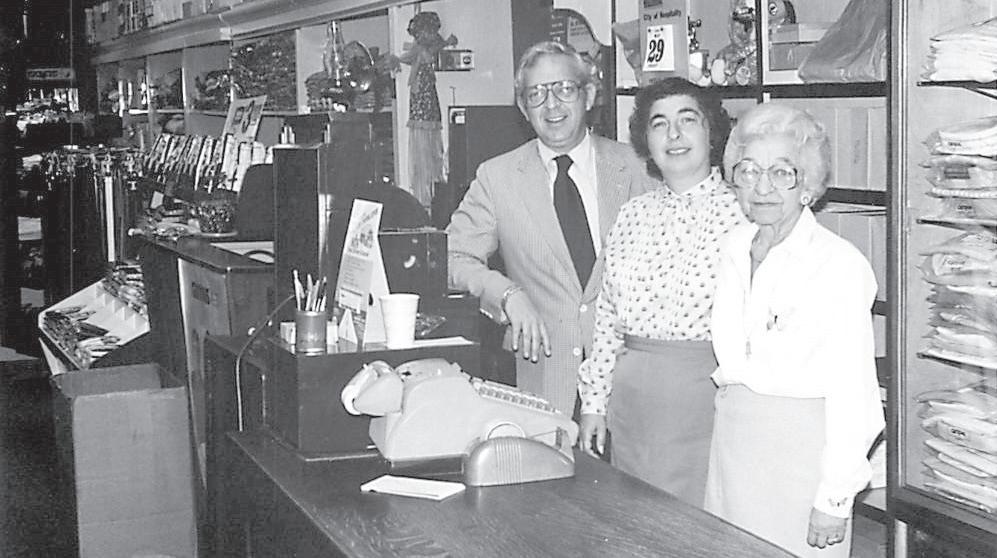


Upper Miami Valley & Greene Co. included in volunteer's


 By Marshall Weiss, The Observer
By Marshall Weiss, The Observer
Austin Reid, 26, grew up in Lancaster, about 30 miles southeast of Columbus, in Fairfield County. The Jewish congregation there, B'nai Israel, had closed a few years before he was born.
"Like many smaller cities and towns, there was a Jewish community there at one point," he says. "But there were still some signs of the community when I was growing up. The building was still there. It had been converted to a private residence, but you could tell it had a religious purpose at one time. There was a war memorial downtown with a Magen David (Star of David) on it in addition to a cross."
Reid, who wasn't born Jewish, remembers wondering what happened to the congregation, and why a Star of David would be engraved on the war memorial.
As an undergraduate history and political science major at Capital University — and a Jew by choice — he decided to find out. For his history capstone project, he researched the history of Fairfield County's Jewish community.
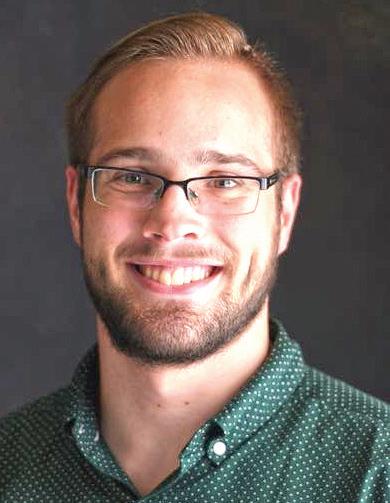
When he dug into that history, he discovered there were several other Jewish communities in small Ohio towns with histories that had never been written about.
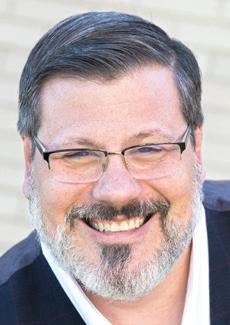
of small Jewish communities in Ohio.



Among those he's completed are the Upper Miami Valley and Greene County, here in the Dayton area.
From the beginning, he learned how to go about this research from The Columbus Jewish Historical Society.
After he graduated Capital University and moved to Ithaca, N.Y. — where he worked for the Hillel at Ithaca College and earned his master's degree in public administration from Cornell University — Reid continued writing about these small Ohio Jewish communities as a volunteer project to stay connected to his home state.
"It really kicked up again during the Covid pandemic because I found myself with a lot more free time," he says. "Some of the volunteer organizations that I would keep myself busy with weren't really functioning, and I needed

Reid is now writing his 14th and 15th histories Continued on Page Four
When I meet with classes, I often start out with a question: What does it take to have a Jewish community? The answers are usually "a rabbi" or "a building for prayer." Sometimes it's "kosher food" or "a Torah scroll." These are extremely important to maintain a Jewish community. But when Jewish communities first came together in Ohio in the early to mid-1800s, you could count the ordained rabbis in the United States on one hand (maybe two). Few Jewish communities in their first decades could afford to buy or erect a building. They'd meet in homes or rent a room or two somewhere to pray. Maybe someone might know how to ritually slaughter cattle and fowl. Probably very few. Then, a student will answer, "To have a Jewish community, you need Jews." My next question: "How many?" True halacha (Jewish law) and tradition, so many Jewish communities organized here when they reached a minyan, a quorum of 10 men. Sometimes it was eight or nine; local Jews could rely on Jewish peddlers crossing Ohio's roads to pull their wagons off for rest and prayer. Jews forming new synagogues would write to established synagogues around the world to raise funds for or to receive Torahs.

THE DAYTON JEWISH OBSERVER • FEBRUARY 2023 PAGE 3
From the editor’s desk
DAYTON Make the “Wright Choice” Houser Asphalt & Concrete 937-223-9207 • 800-319-1114 • www.houserasphalt.com Wright Brothers Home Asphalt Restoration Paving, Repairs, Sealcoating, Concrete, Walks, Patios, Drainage, Curbs, Approaches • Residential & Commercial Our 51st Year 1 & 2 BEDROOMS AVAILABLE NOW! 590 Isaac Prugh Way — Kettering LincolnParkSeniors.com follow us on Premier Retirement Living Step into modern luxury! Our 1 & 2 bedroom apartment homes include custom cabinets, granite countertops, stainless steel appliances, and premium finishes to enhance your perfect dream home. It’s worry-free retirement living with premium amenities, freedom from cooking, cleaning, and running errands... all for one reasonable monthly fee. CALL NOW, AVAILABILITY IS LIMITED! MAKE THE MOVE TO CAREFREE LIVING IN 2023! Please call Jonathan at 937-298-0594 to schedule your personal TOUR AND A PRIVATE LUNCH Contact Patty Caruso at plhc69@gmail.com to advertise in The Observer.
Marshall Weiss
chronicles
Austin Reid
Temple Anshe Emeth in Piqua dates to 1858
Temple Anshe Emeth
Arnovitz Family
(L to R) Theodore Arnovitz, Beverly Saeks, and Sara Arnovitz at Sol's Store in Xenia, in business from 1931 to 1998.
BMB Why
OMenachem
do I love Tu B’Shevat? It’s when this single pup gets lots of dates.
Histories
Continued from Page Three
something to keep my mind off the news, and so I really picked up the project more intensely."
The Upper Miami Valley
He learned about Piqua and the Jewish community of the Upper Miami Valley through his research on Chillicothe, because of historical family ties between the two Jewish communities.
"Piqua is a fascinating community to me because it is among the older Jewish communities in Ohio and has had a continuous presence there since 1858," he says. "Jewish families were living in the Piqua area before 1858, but 1858 is when the congregation was founded."
Through Temple Anshe Emeth in Piqua, Reid connected with longtime congregant, Greenville resident Eileen Litchfield.
"She was really enthusiastic about the project and helped me connect with other local people to polish up the history and have that buy-in from the local community, which was exciting."
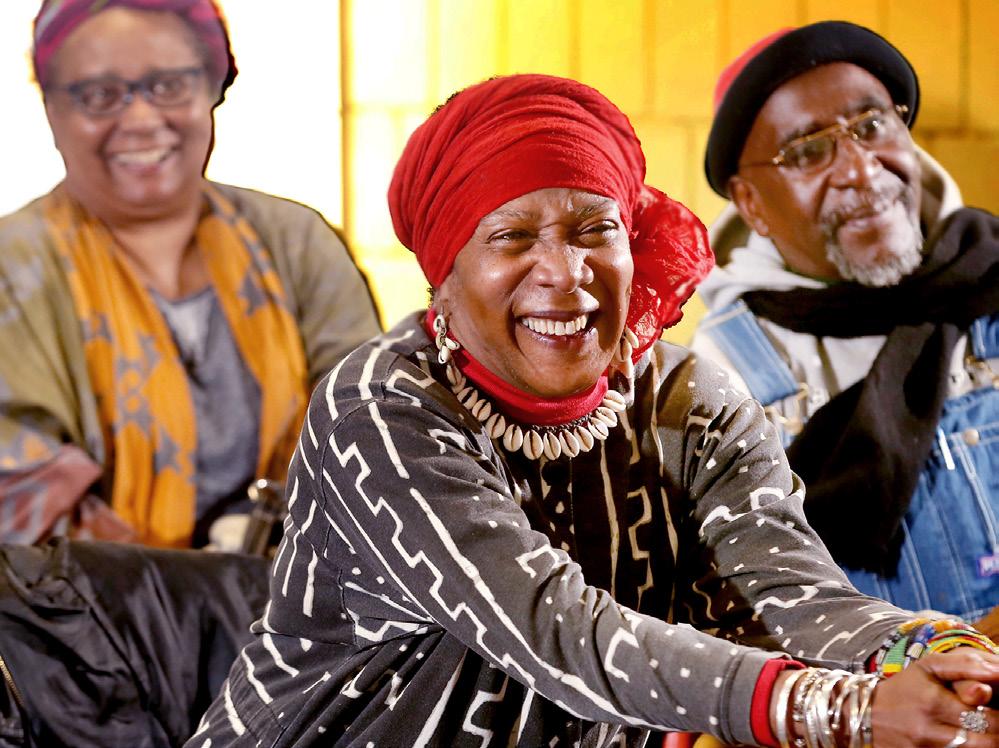
Litchfield describes Reid's work for Anshe Emeth as a true gift.
"There aren't enough adjectives to describe my delight in getting this accomplished for temple," she says. "I have been collecting history, randomly, for 20 years, and his research blew that out of the water in a minute. I cannot tell you how ecstatic I am for his volunteering to do this."
and St. Mary's had some families that would come down occasionally. It's really always been a regional congregation. And even today, I think only one member lives in Piqua."
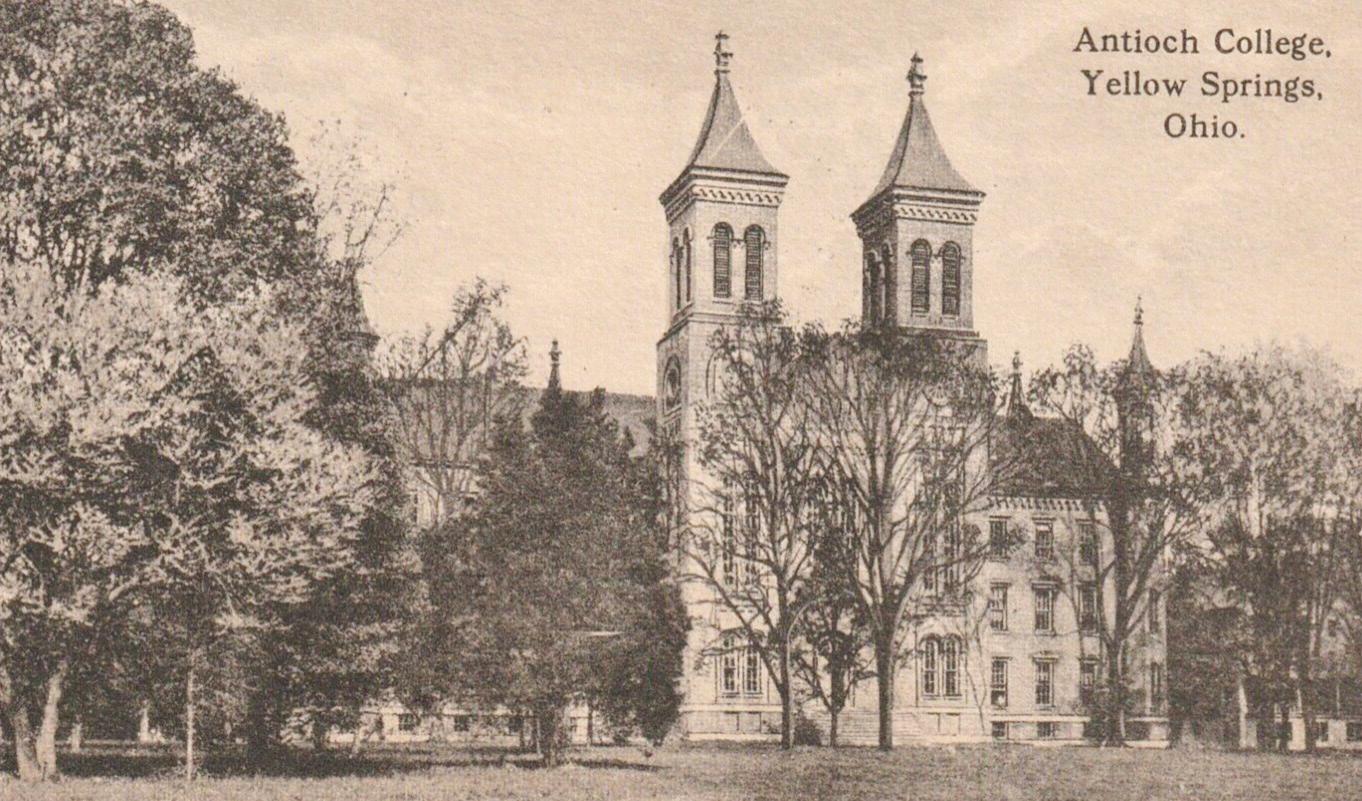
He admires Anshe Emeth's generations of hard work and leadership to maintain itself.
"I'm sure it would have just been easier to not really spend the resources to have a Jewish community, and especially now, it's so easy to travel to Dayton from Piqua," he says. "And in some of these communities, that's what happened."
Greene County
Reid came to research Greene County after he saw an article in Cincinnati's American Israelite newspaper in 2017 about the Arnovitz family and their store in Xenia, Sol's Store, which was in business from 1931 to 1998.
He says Greene County has a long tradition of Jewish academics, particularly connected to Antioch College.
Editor and Publisher
Marshall Weiss
mweiss@jfgd.net
937-610-1555
Contributors
Candace R. Kwiatek
Advertising Sales Executive Patty Caruso, plhc69@gmail.com
Administrative Assistant Samantha Daniel, sdaniel@jfgd.net 937-610-1555
Billing Sheila Myers, smyers@jfgd.net 937-610-1555
Proofreaders
Rachel Haug Gilbert, Pamela Schwartz Observer Advisor Martin Gottlieb
Published by the Jewish Federation of Greater Dayton Mary Rita Weissman President Dan Sweeny President Elect Marni Flagel Secretary Neil Friedman Treasurer Ben Mazer VP Personnel

Teddy Goldenberg VP Resource Dev.
Dr. Heath Gilbert Immediate Past Pres. Cathy Gardner CEO
The Dayton Jewish Observer, Vol. 27, No. 6. The Dayton Jewish Observer is published monthly by the Jewish Federation of Greater Dayton, a nonprofit corporation, 525 Versailles Dr., Dayton, OH 45459.

Views expressed by columnists, in readers’ letters, and in opinion pieces do not necessarily reflect the opinion of staff or layleaders of The Dayton Jewish Observer or the Jewish Federation of Greater Dayton. Acceptance of advertising neither endorses advertisers nor guarantees kashrut.
The Dayton Jewish Observer Mission Statement
Antioch College Prof. William Leiserson was a labor mediator and arbitrator.
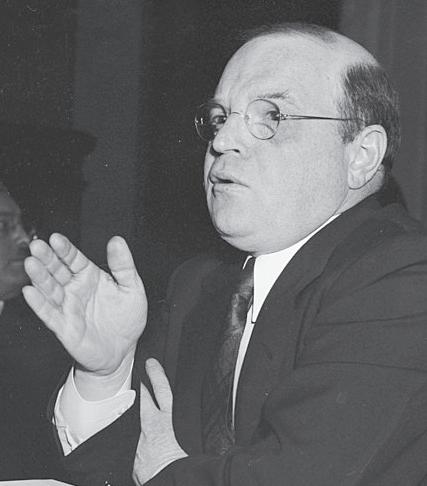
"Even in the 1920s, Antioch College had some prominent Jewish faculty members. There was Rudolph Broda, a social sciences professor starting around 1928. And his wife, Erna, she was professor of German. And William Leiserson, an economics professor from 1926 to 1933. His work on labor relations is still influential today, because in 1933, the Roosevelt administration asked him to come to D.C. One of the things he worked on was the Railway Labor Act of 1934, and that still governs some of the labor relations and airlines and railroads today."
To support, strengthen and champion the Dayton Jewish community by providing a forum and resource for Jewish community interests.
Goals • To encourage affiliation, involvement and communication.
• To provide announcements, news, opinions and analysis of local, national and international activities and issues affecting Jews and the Jewish community.

• To build community across institutional, organizational and denominational lines.
• To advance causes important to the strength of our Jewish community including support of Federation agencies, its annual campaign, synagogue affiliation, Jewish education and participation in Jewish and general community affairs.
• To provide an historic record of Dayton Jewish life.
Litchfield added she was amazed to learn there were Jews living in Greenville in the 1850s.
"It was never a very large community," Reid says of Piqua. "But it's always drawn from several communities for its members. So Troy, but also Greenville and Wapakoneta
In his history of Greene County, Reid identifies the earliest known Jew there as Benjamin Bruel of England, who was living in Xenia by 1870. He operated a clothing store there until 1873.
Reid's history of Jewish Greene County comes up to the present, with

The Dayton Jewish Observer

PAGE 4 THE DAYTON JEWISH OBSERVER • FEBRUARY 2023 DAYTON
OBSERVER THE DAYTON
Please recycle this newspaper.
daytonjewishobserver.org art, illustration, poetry, movies, performances, workshops, and panel discussion programs. All at the Dayton Metro Library! For details, visit DaytonMetroLibrary.org/ blackculture.
LOC
Embrace all aspects of Black Culture with
Austin Reid says Greene County has a long tradition of Jewish academics, particularly connected to Antioch College in Yellow Springs.
the Yellow Springs Havurah, which is active to this day.
Eastern European Jews took the lead
In all the small Jewish communities in Ohio that Reid has researched, he says, German Jewish families lived there early on, but it was the great wave of Jews of Eastern Europe — who began arriving in America in the early 1880s — who provided the numbers to start viable Jewish organizations.
"Xenia is an example of that. We do have early German Jewish families. Xenia just barely got to the size of having in the 1910s a local community that was formal," Reid says. "But at least in Xenia, it was never quite large enough to be sustainable."
The full list of Reid's histories of small Ohio Jewish communities comprises Ashtabula County, Athens County, Chillicothe, Coshocton, Fremont, Greene County, Lancaster, Newark, New Philadelphia, Portsmouth, Steubenville/ Weirton, the Upper Miami Valley, and Zanesville. He's also written a history of the Jews of West Virginia.
"You had these layleaders with maybe just a little more — compared with their peers, perhaps — knowledge of the religious laws and they really just carried these communities. They'd have occasional itinerant rabbis who would come through and maybe do more formal instruction, but it really

was just the laypeople."



He's now finishing up his histories of Mansfield and Massillon, Ohio. Reid started writing about Mansfield because he heard its one Jewish congregation is moving from its 44-yearold building. "There, it was nice for some of the congregants to reflect on their memories."
Austin Reid
The largest of the Ohio Jewish communities he's written about was Steubenville/ Weirton, which at one time had about 1,000 Jews.
The oldest he's written about is Chillicothe; its firstknown Jews date to the 1830s.

With most communities he's written about, he knows of at least one Jewish family still living there.
"But some of the places, indeed, have not had organized Jewish life there in several decades," he says. "One example is New Philadelphia, Ohio. The congregation there closed in the '60s, but there are still Jewish families there."
Outsized contributions
He was surprised to find that in a lot of these small towns, Jews served in public office well before 1900.
"You had examples of playing important roles in secular organizations like the Masons or veterans' groups, societies."
He highlights those contributions to economic, social, and civil life in his histories.
"While the Jewish population of these communities has never been more than 1 percent or 1.5 percent, it's an outsized influence on hospitals in the areas, the charitable societies in the areas, helping to organize fire departments, to raise money for orphanages."
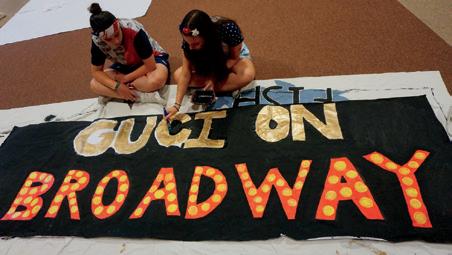

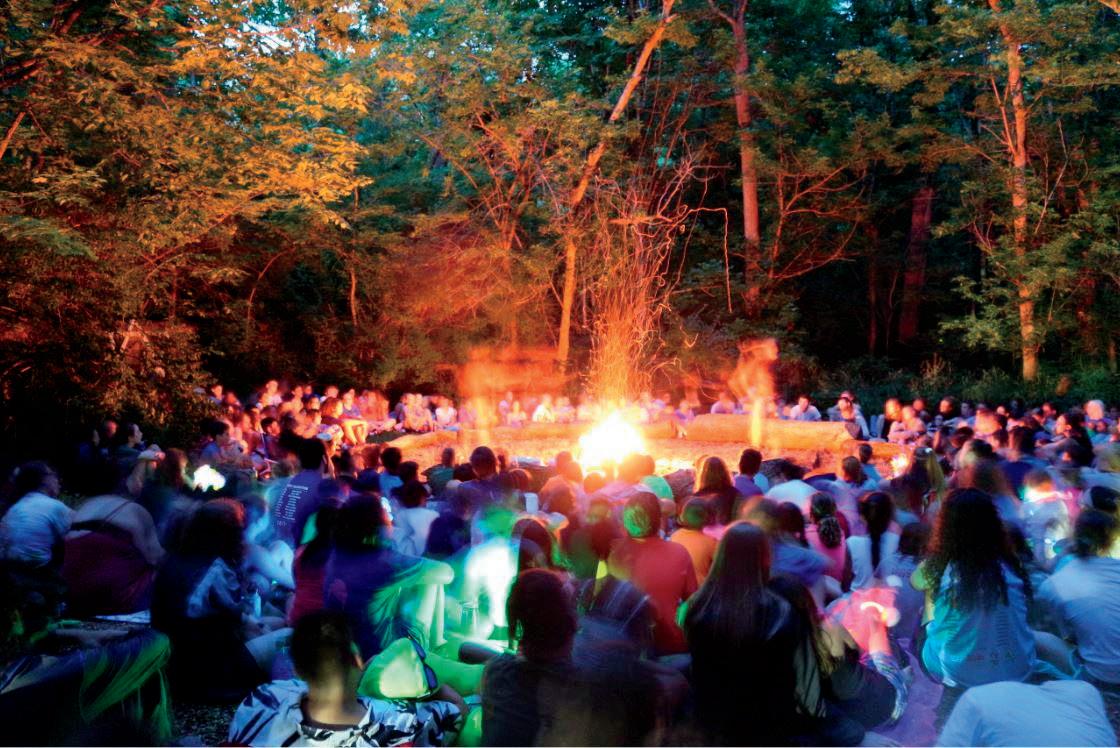
Reid says he took on this project for two reasons.
"One, I think the mitzvah of honoring the deceased is an important one. I volunteer with a burial society, a chevra kadisha, so this is probably a related value that informs why I volunteer with the chevra kadisha and why I do these stories."
He also believes small-town Jewish communities played an important role in Judaism becoming a more mainstream
Austin Reid's A History of Jewish Life in the Upper Miami Valley is posted at columbusjewishhistory.org/histories/history-jewishlife-upper-miami-valley.
Greene County's Jewish Heritage, also by Reid, is posted at columbusjewishhistory.org/histories/greene-countys-jewish-heritage.
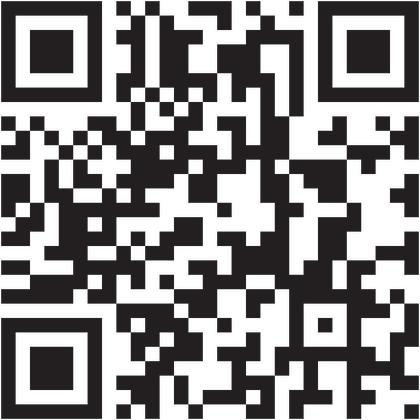
Nine of his other local Ohio Jewish histories are also posted at columbusjewishhistory.org/research/central-ohio-histories.
religion in the United States.
"I think after World War II, we really saw that," he says. "Judaism didn't always have that insider status and perhaps now we're seeing an increase in antisemitism. The existence of these small-town Jewish communities and the fact that Jewish life had a visible presence in so many places was important for people's understanding of Jewish life.
"And with that absence, there aren't these ways for people who aren't Jewish to connect












with this community, and in that absence, it's a loss for these communities to not have that."
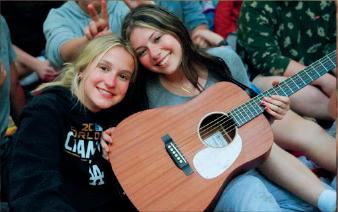

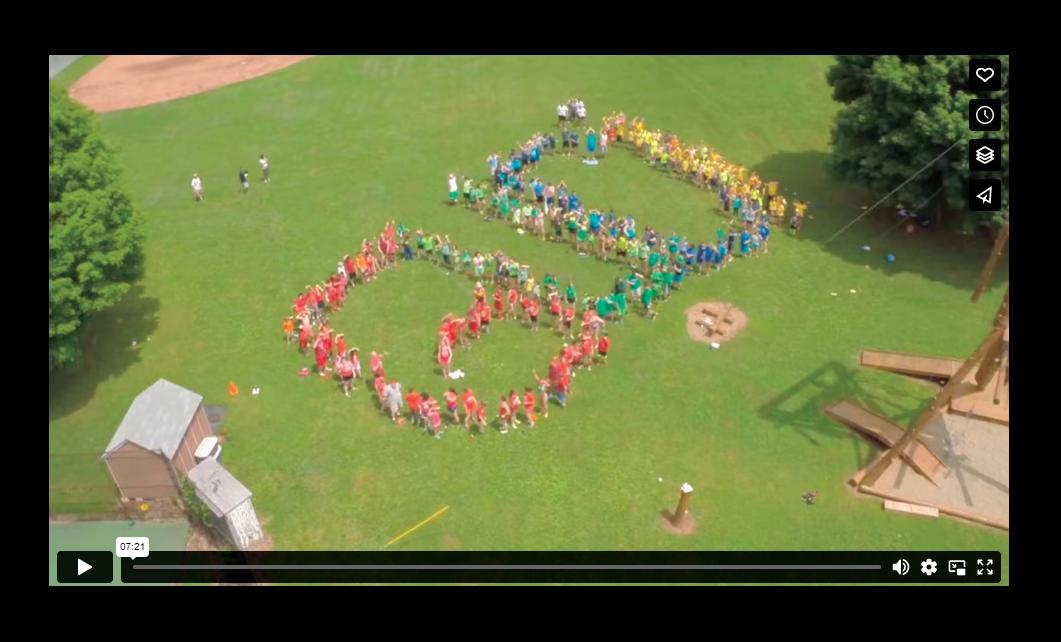
Reid now lives in Pittsburgh. He says once he completes the two Ohio Jewish community histories he's writing, he'll work on filling in gaps on small Jewish communities in western Pennsylvania.
When asked if he has plans to compile his Ohio histories into a book, he says, "Perhaps someday I'll try to tie together all the pieces. It will be a project for down the road."
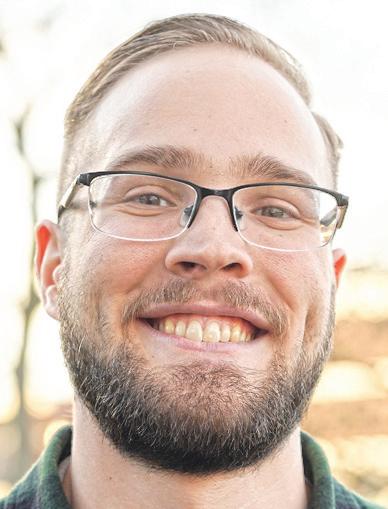
DAYTON A Healthy Alternative We Use The Best Ingredients Prepared Fresh Daily CJ CHAN www.mycjchan.com 536 Wilmington Ave. Dayton, OH 45420 937-259-9866 2ND LOCATION! 2747 W. Alex Bell Rd. Moraine, OH 45459 Sports Climbing Tower Camping Dance Swimming Art Wilderness Drama Farm + Garden Music Summer Fun What will you try this summer? Bunk Night
'I think the mitzvah of honoring the deceased is an important one.'
Righteous Among the Nations, Marinus Bosma dies at 97











In the Netherlands, he and his family rescued Jews from the Holocaust

Longtime Tipp City resident Marinus Bosma — a recipient of the title Righteous Among the Nations from Yad Vashem: The World Holocaust Remembrance Center in Israel — died Nov. 4 at the age of 97.
Natives of Arnhem in the Netherlands, he, his parents, and his sister found shelter for at least 30 Jews and they themselves housed at least 12 during the Holocaust. In 1943, Bosma and his father brought the last group of Jews to Amsterdam where they were handed over to another group that helped them escape to Belgium. Between 1943 and 1945, the Bosmas were in hiding as members of the Dutch underground.
Yad Vashem honored Bosma with the medal and Righteous Among the Nations title in a ceremony at the Dayton Art Institute in 2005. The event also honored his parents and sister posthumously.

“That’s the way we honor and respect and love the people who saved the Jews,” Uriel Palti, consul general of Israel to the Mid-Atlantic Region in the United States, told Bosma at the ceremony.

As Bosma accepted the medal, he cried. Before the ceremony, Bosma told The Observer he wasn't sure he could handle the emotions behind the award. He spoke of his mother, who insisted that his family could not look away.
It was his mother who placed more than 30 Jews seeking safety and housed and fed first a family of four and then another group of eight for more than a year before the Bosmas were caught.









To make room for everyone to sleep, the Bosmas constructed Murphy-style beds throughout the house that folded up to resemble bookcases.
The bottom drawer of the buffet was removed, and molding was added to conceal a trap door leading to a hidden crawl space.

The family concealed evidence police might find, such as open books, extra clothing, unexplained warm chairs.

Bosma's mother and sister were visiting a relative when the Gestapo knocked on the door in the summer of 1943.
A well-practiced plan went into action. His father pretended to be upstairs changing while Bosma yelled that he couldn't find the key to unlock the door.





The Jews in hiding opened the buffet’s trap door, dropped to the floor, and rolled into the crawl space. It took seconds and left no evidence for the Gestapo.






Father and son convinced the Gestapo they had the wrong house. The next day, the two divided the hidden Jews and took them on separate trains to Amsterdam; all were lucky enough to avoid ID checks.
Bosma returned home to find his mother and sister interrogated by the Gestapo.
While police questioned Bosma, his mother asked to walk her daughter to school. While she was out, she asked a friend to intercept her husband and prevent
his capture. Then, while the Gestapo watched the front door of the house for her husband's return, she led the family out the back.
The family endured nearly two years of separation while living underground. Bosma lived in the countryside with a sympathetic family and another refugee.
In the resistance, he blew up rail lines supplying the Germans.

In 1945 he joined the Dutch army, helping to liberate the Indonesian colonies from the Japanese. There, Bosma met his wife, Nelly Marie Bosma. She died 25 days after her husband, Nov. 29, at the age of 96. They were married 73 years. — Marshall
Weiss



















































































































PAGE 6 THE DAYTON JEWISH OBSERVER • FEBRUARY 2023 DAYTON
Marshall Weiss
Marinus Bosma (R) received the Yad Vashem medal and title Righteous Among the Nations in Dayton, June 29, 2005, from Mid-Atlantic States Israeli Consul Gen. Uriel Palti.
November 5 - 12 Pre-tour for first-timers November 3 - 5 For pricing and itinerary visit JewishDayton.org or call Alisa Thomas at 937-610-1796 VISIT NEW AGAM MUSEUM TOUR WINERY EXPLORE FOOD MARKETS EXPERIENCE FINE DINING FOOD, WINE, CULTURAL ARTS AND PARTNERSHIP JOIN US JOIN US Contact Patty Caruso at plhc69@gmail.com to advertise in The Observer.
ADL report ‘should be wake-up call to all of us’
By Becky Raspe Cleveland Jewish News
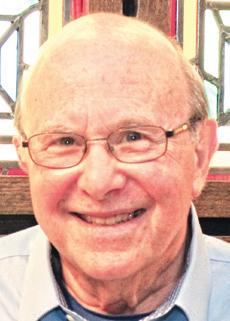
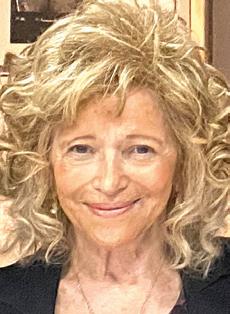
The Anti-Defamation League released new survey results Jan. 12, which suggests the number of Americans harboring antisemitic prejudice has nearly doubled since a 2019 study on a similar topic.
Conducted online in September and October 2022, the study surveyed a weighted, representative sample of 4,007 respondents from the NORC AmeriSpeak panel.
This is the first of several reports ADL plans to release based on this survey. The results also included in-depth, hour-long, oneon-one interviews with more than 100 Americans in addition to the online survey.
ADL has regularly conducted nationally representative surveys about attitudes toward Jews. In partnership with NORC and the One8 Foundation, the survey was updated to examine antisemitism more holistically, and also evaluated sentiment toward Israel, according to an ADL news release.
Additionally, 39 percent of
Shabbat Angels Americain
Israel Goldfarb, Shalom Aleichem, and the Search for Nusach America
the respondents indicated they believed Jews are more loyal to Israel than the United States; 20 percent indicated Jews have “too much power” in the United States; 21 percent agreed Jews “don’t care” about anyone other than themselves; and 53 percent indicated Jews go out of their way to hire other Jews in the workplace.
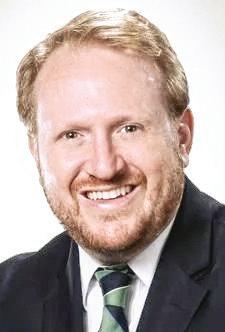
ADL Regional Director James Pasch said that as someone “on the front lines” of fighting antisemitism, nothing in the report’s findings shocked him. Based in Cleveland, ADL's region office covers Ohio, Kentucky, West Virginia, and western Pennsylvania.
“We’ve been responding to record levels of antisemitic incidents in the region over the last several years,” he said, adding that in 2022, the regional office saw the highest number of antisemitic incidents in Ohio since it began tracking in 1979.
“So, while disturbing and sobering, it’s another indication of the rising tide of antisemitism in the nation.”
As numbers increase, so does the frequency of antise-
mitic and anti-Zionist violence, Pasch said.
“This survey should be a wake-up call to all of us that we need to do more,” he said. “The growth in antisemitic beliefs and attitudes leads to violence. The questions we asked are some of the most dangerous about Jews that have historically led to violence.”
Pasch said it's also important to note the survey was conducted before American rapper Ye, formerly known as Kanye West, triggered a series of controversies in October 2022, including sharing antisemitic remarks on social media. But the influence of celebrities and media personalities like Ye is just one of the many reasons why the ADL is seeing an increase in antisemitic sentiments, he explained.
“From the growing polarization of America, the dysfunction of the right and left in our political word, to the growth of conspiracy theories and misinformation in our online world, it all creates a perfect storm for the growth of antisemitism,”
The Rick Pinsky Brunch Speaker Series
Sponsored by Men’s Club
Sundays • $7 • RSVP to 937-293-9520
Feb. 5, 10 a.m.: Marshall Weiss Editor & Publisher, The Dayton Jewish Observer, Jewish Connections to the Titanic
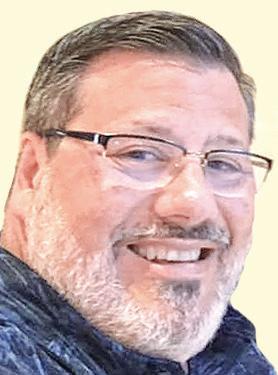
In partnership with Miami Valley Jewish Genealogy & History
Feb. 19, 10 a.m.: Larry Burick Attorney
Religious Freedom in the Roberts CourtGood or Bad for Jews?
Via Zoom with Ethnomusicologist
Dr. Rachel Adelstein
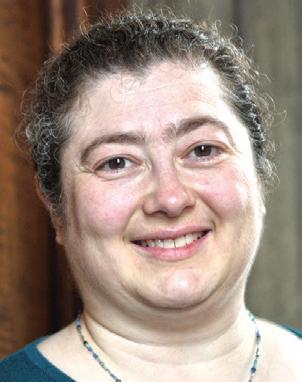
Thurs., Feb. 2, 7 p.m.
In honor of Shabbat Shira, explore the origins of a Shabbat tune we all know. Zoom link at bethabrahamdayton.org.
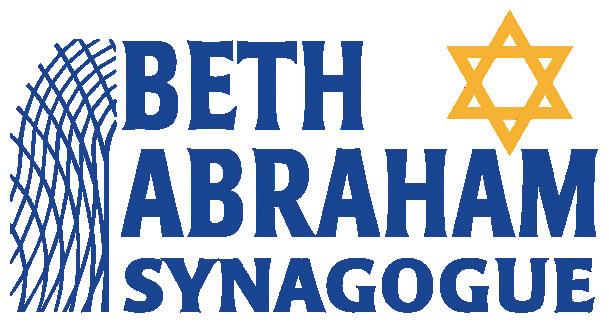
Feb.
Pasch said. “And that inevitably leads to the growth of all hate. What starts with Jews never ends with Jews.”
A major benefit of the survey is now ADL offices across the country can use it as a guide to determine what is driving the growth of antisemitism and design interventions as a response, Pasch said.
“Once we have a key sense of what drives antisemitism, we can better target interventions towards those specific drivers,” he said. “It’s going to take a whole-of-society approach to
combat the rise in antisemitic beliefs, attitudes and incidents. Every single one of us has a role to play, and what this study shows is we can’t wait any longer for everyone to get involved.”
And while organizations play a large part in advocating on the statewide and national level, Pasch said the role individuals play in their communities is just as important.
“Whether it is uncomfortable conversations with friends, colleagues, neighbors or elected officials, we can no longer let antisemitic comments get by,” he said. “We can’t ignore it anymore. Those uncomfortable conversations are necessary to stop this in its tracks. We can all do our part in our communities.”

THE DAYTON JEWISH OBSERVER • FEBRUARY 2023 PAGE 7
Sugar Camp Circle • Dayton, Ohio 45409 937•293•9520 • www.bethabrahamdayton.org
Abraham, Dayton’s only Conservative synagogue, is enthusiastically egalitarian and is affiliated with the United Synagogue of Conservative Judaism.
our complete program schedule, go to bethabrahamdayton.org.
305
Beth
For
26, 9:45 a.m.: Renate Frydman, Ph.D. Chair, Dayton Holocaust Committee A Reason for SurvivalTo Understand, To Educate, To Heal at Temple Israel, 130 Riverside Dr., Dayton, part of Ryterband Lecture Series
THE REGION
'Every single one of us has a role to play, and what this study shows is we can't wait any longer for everyone to get involved.'
ADL Regional Director James Pasch
NY Federation CEO offers rare criticism of Israel’s right-wing government
By Andrew Silow-Carroll New York Jewish Week
The head of North America’s largest Jewish Federation made the rare step of criticizing proposed legislation by Israel’s government and “imploring” its prime minister to shelve it.
In an email sent Jan. 20 to supporters of the UJA-Federation of New York, its CEO, Eric Goldstein, wrote that he is “alarmed” by recent judicial reforms introduced by Israel’s newly installed justice minister. The reforms, a priority of what has been described as the most right-wing government in Israeli history, would allow Israel’s parliament to override decisions by the Supreme Court and further politicize the selection of its justices.

“The current proposed legislation raises dramatic concerns,” wrote Goldstein, an attorney who was named to head UJA-Federation in 2014. “It eviscerates the role of the judiciary by allowing Supreme Court decisions to be struck down by the barest majority of the Knesset — undermining the very
foundations of Israel’s democracy and subjecting all minority groups to the tyranny of the majority.”
“I respectfully implore” Prime Minister Benjamin Netanyahu to make good on previous pledges that he would block laws that threatened the independence of Israel’s justice system, wrote Goldstein.
Jewish Federations — umbrella philanthropies that are set up to serve the range of Jewish denominations and political expressions — seldom publicly criticize the Israeli government, whose social service sector is among their biggest beneficiaries. Goldstein acknowledged as much in his letter, writing that “many insiders advised that off-the-record conversations with senior government officials would be more productive than strident public pronouncements.”
In his message, Goldstein was careful to note his pro-Israel bona fides, noting that two of his four children
immigrated to Israel and now live in Tel Aviv, including one serving in the Israeli military. And after acknowledging complaints on Israel’s right that the Supreme Court had grown less accountable to the Israeli public, Goldstein wrote, “Judicial reform can be achieved without threatening the fundamental democratic character of Israel.”
Israel’s new right-wing government has sent waves of anxiety through the leadership of America’s largest Jewish organizations, who worry that liberalleaning rank-and-file Jews will become alienated from an Israeli government that includes far-right ideologues like Finance Minister Bezalel Smotrich and National Security Minister Itamar Ben Gvir. In December, Rabbi Rick Jacobs, president of the Union for Reform Judaism — representing American Judaism’s largest denomination— wrote that the “extremist political agenda of this new government is profoundly distressing, representing radical policy shifts that are antithetical to the core values of liberal Jews.”
Goldstein addressed concerns over alienation in his letter. “(T)here’s an instinct among some in our community to turn their back on Israel in moments of serious disagreement. But cutting ties or support for Israel is precisely

the wrong response,” he wrote. “To the contrary, this is the moment to engage even more, using all the means at our disposal to help sustain a Jewish and democratic Israel.”
To that end, Goldstein wrote that UJA’s Israel office and the Forum of Foundations in Israel are meeting with “dozens” of Israeli philanthropies “to think together about shared strategies for addressing the current moment... and to discuss joint funding initiatives to counter the impact of potential new governmental policies and legislation.”
Representing often fractious communities, especially on Israeli domestic affairs, Federations try to avoid political statements or positions. One of the few exceptions has been a decades-long, often public disagreement over policies in Israel that appear to discriminate against the non-Orthodox religious denominations, which represent a majority of affiliated American Jews.
But Goldstein said his concerns over the judicial reforms are consistent with the Federations’ support for various causes that some think will be undermined by the new Israeli government’s policies. “We’ve long invested in programs and nonprofits that amplify diverse voices and work to build bridges of understanding, helping to create spaces for all the tribes of Israel — Secular, Haredi, Arab, LGBTQ+, Ethiopian, and more,” he wrote.
PAGE 8 THE DAYTON JEWISH OBSERVER • FEBRUARY 2023 THE WORLD
BethanyLutheranVillage.org 937.436.6850 INDEPENDENT LIVING ASSISTED LIVING MEMORY SUPPORT Bethany Village offers the modern homes, superior amenities, and social atmosphere to match your active lifestyle. And with your home maintenance a thing of the past, all that’s left for you to do is plan – and truly enjoy – your day ahead. There’s nothing ordinary about Bethany Village. Imagine the possibilities here. RETIREMENT,
REIMAGINED.
Eric Goldstein
Netanyahu fires top Shas ally from cabinet after High Court nixes convicted minister
By Carrie Keller-Lynn, Times of Israel
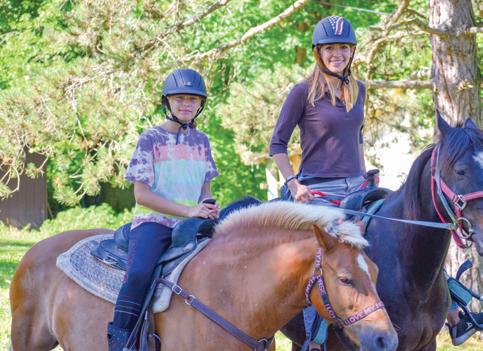

Prime Minister Benjamin Netanyahu dismissed top ally Aryeh Deri from the cabinet Jan. 22, in a move expected to trigger political uncertainty despite being mandated by the High Court of Justice and advocated by the attorney general.
Netanyahu said that he was “compelled, with a heavy heart” to comply with the Jan. 18 court ruling — which cited Deri’s multiple convictions and recent apparent deception of a lower court — and terminate Deri’s dual appointment as interior and health minister.
Deri’s Shas party has pushed for Netanyahu to find a path for him to rejoin the cabinet, and the prime minister pledged to find “any legal way whereby you can continue to contribute to the State of Israel.”
Responding to his dismissal, Deri said that after the court decision “it was clear” to both himself and Netanyahu that he would leave the government, but that he would not be withdrawing from political life. “No judicial decision will prevent me from serving and representing” the 400,000-odd Shas voters who gave his ultra-Orthodox party 11 Knesset seats in November’s elections, he said.
Deri promised to continue to lead Shas as a lawmaker in the Knesset, chairing its faction meetings, and to attend meetings of coalition party chiefs. Indeed, Deri participated in a meeting of coalition chiefs convened by Netanyahu soon after the cabinet meeting at which he was fired.
A spokesman for Deri said the Shas chief will also retain his vice prime minister title, which is largely honorific and carries no official authority. It is unclear whether it will permit Deri to keep an observer seat at the cabinet table, but the spokesman said it was likely that the government would continue to invite Deri to its meetings as an observer.
Briefly, during the Jan. 22 cabinet meeting, Netanyahu temporarily exited the room and left the meeting in Deri’s charge. Earlier in January, Deri briefly filled in for Netanyahu when the prime minister underwent a routine colonoscopy.
In his comments Jan. 22, the premier slammed the court’s “unfortunate decision” to disqualify Deri from ministerial office, saying it ignored “the will of the people, as shown by the considerable trust that the public placed in the elected representatives who sit in my
government, when it was clear to all that you would serve in the cabinet as a senior minister.”
“I reasoned that it was important that you serve the State of Israel as a member of the security cabinet in my government, where you could be of influence, given your years of experience as a member of cabinet in the governments of the late prime ministers Yitzhak Shamir and Yitzhak Rabin — rich experience that contributed to Israel’s security and resilience,” Netanyahu continued, reading to Deri, seated immediately to his right, from a prepared letter.
The prime minister will be hardpressed to solve the problems caused by Deri’s ouster, barely three weeks after swearing in a hardline coalition that promised political stability, and just three months after winning Israel’s fifth national election in under four years.
It’s unclear who will replace Deri in the interior and health ministries. Normally, when a minister quits, his portfolios automatically revert to the prime minister for a temporary period until a new minister is appointed. But since Netanyahu is under criminal indictment in connection to a separate corruption investigation, he is blocked by law from holding any cabinet seat sans the premiership.
As unsourced reports swirled about various potential outside candidates and temporary Shas leaders filling in for Deri, Opposition Leader Yair Lapid called on Netanyahu to make an immediate appointment to fill the vacancies.
“What we see is not a government, it’s a circus. Netanyahu is weak, but he needs to appoint a full-time health minister and interior minister today,” Lapid said in a statement shortly after the cabinet meeting.
Deri was given oversight over two of Israel’s most powerful and well-funded ministries despite his financial crimes. Although Netanyahu did not refer to Deri’s imminent ouster at the outset of the cabinet meeting, he dedicated the bulk of his remarks to “congratulate Vice Prime Minister and Health Minister Aryeh Deri” for expanding health services covered by the country’s national health insurance.

The premier fired Deri four days after the High Court issued its bombshell ruling that the decision to appoint the Shas leader as interior and health minister was “unreasonable in the extreme” in light of Deri’s criminal convictions,
most recently in January 2022.
Deri struck a plea bargain at that time with the Jerusalem Magistrate’s Court, which let him quit Knesset before his sentencing and thus avoid a hearing on whether his tax fraud conviction carried moral turpitude — a designation that would have barred him from holding public office for seven years.
The court at the time believed that Deri was retiring from public life. However, he continued to lead Shas from outside the Knesset and was quickly reinstated as a lawmaker in the Nov. 1 election. Deri then demanded that Netanyahu ensure his way back to the
cabinet table, despite the Basic Law: The Government requiring the Central Elections Committee to determine whether his crime carried moral turpitude before he could be appointed a minister.
The coalition rushed through a fix to allow Deri to be sworn in with the rest of the cabinet on Dec. 29.
Deri doubled down Jan. 22 on his claim that he never gave the court the impression that he was quitting politics, despite the judge’s comments from the time confirming exactly that impression. The High Court in its Jan. 18 ruling partially relied on the concept of Continued on Page 10
The Summer of a Lifetime



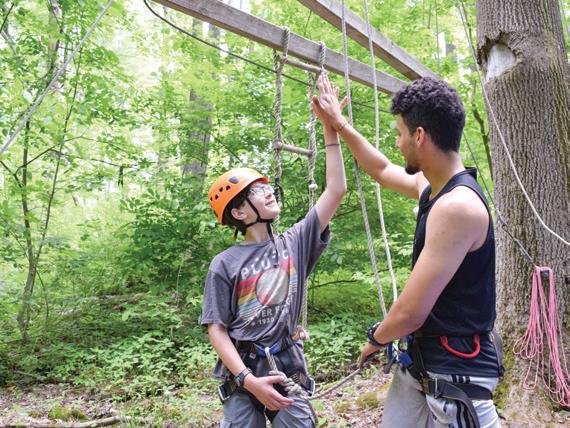
THE DAYTON JEWISH OBSERVER • FEBRUARY 2023 PAGE 9 THE WORLD YOU THE PLACE TO BE
Tucked away on 325 wooded acres 30 miles east of Cleveland is Camp Wise, Ohio’s only Jewish overnight camp. Each summer, more than 500 campers in grades 2-12 from Ohio and beyond create lifelong friendships and grow in countless positive ways. What Makes Camp Wise Special • Adventures and activities for every interest • Highly experienced and talented staff • Excellent camper care and social workers • Jewish values, Israeli culture and Shabbat programs • A kosher kitchen WATCH THE FUN mandel jcc ofclevel a n d Reach out to our team at wisekids@mandeljcc.org • 216-593-6250 Get $500 off camp fees through the Seeds Project SUBSIDY INFO AT jewishdayton.org
Deri was given oversight over two of Israel’s most powerful and well-funded ministries despite his financial crimes.
PM Benjamin Netanyahu (R) reads a letter to Shas Chair Aryeh Deri, informing Deri he must remove him from ministerial office, at the weekly cabinet meeting in Jerusalem, Jan. 22.
Kobi Gideon/GPO
R&C Firearms Training
 Ron Wynne, Instructor Curtis Estep, Instructor
Ron Wynne, Instructor Curtis Estep, Instructor
Learn to properly and safely handle firearms. Bring this ad and save $15 per lesson, $60 each (reg. $75)
Call 937-529-9076
Brunch Discussion
Convicted minister
Continued from Page Nine
judicial estoppel, arguing that Deri could not benefit from a lenient plea deal based on the assumption that he would leave public life, and then
Jewish Connections to the Titanic


Sunday, Feb. 5, 10AM
$7 payable at the door
Beth Abraham Synagogue
305 Sugar Camp Cir., Oakwood 45409
RSVP to Beth Abraham, 937-293-9520

Presented by Miami Valley Jewish Genealogy & History and Beth Abraham Synagogue Men’s Club’s Rick Pinsky Brunch Speaker Series
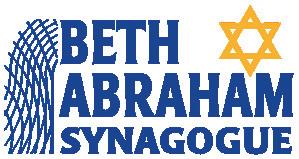
Marshall Weiss, editor and publisher of The Dayton Jewish Observer, will share stories of the Titanic’s remarkable Jewish connections and how they have led to recent special exhibits at the Titanic Museums in Pigeon Forge, Tenn., and Branson, Mo.
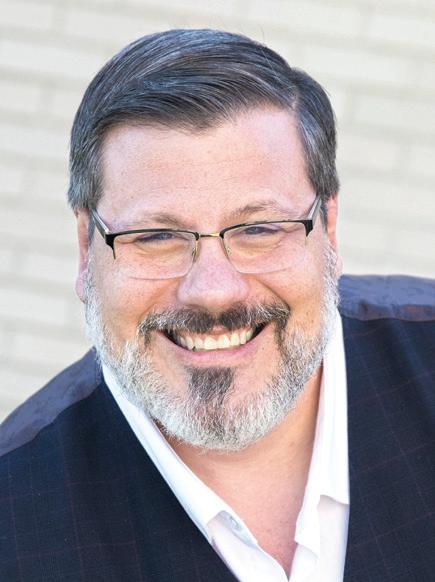
quickly return to public life.
In addition to employing estoppel, the court struck down Deri’s appointment as failing the test of reasonableness, a judicial yardstick that Netanyahu’s government has vowed to eliminate amid its efforts to pass sweeping changes to the system of checks and balances.
“I can tell my friends in the government and the public that it was clear to the prosecution and it was clear to the previous attorney general, Dr. Avichai Mandelblit, that I had no intention and that I never had an intention and did not commit to quitting political life. Things were clear and on the table from the beginning of the discussions to the end,” Deri said during the cabinet meeting.
The push by Netanyahu’s government to remake the judiciary would also include transferring the appointment of judges to political control and creating a mechanism to protect Basic Laws from court
interference and to re-legislate other laws struck down by the court.
His government says it is necessary to correct the balance of power between the political and judicial branches, but critics, including more than 100,000 Israelis who took to the streets on the night of Jan. 21 to protest the reform plan, say it threatens democratic institutions and endangers civil liberties by giving virtually all power to the governing coalition.

Following the cabinet meeting, key coalition leaders met with Netanyahu. A Likud spokesman said that the meeting was conducted in “good spirits” and with “warmth.”
Religious Zionism leader Bezalel Smotrich attended, despite having boycotted the cabinet meeting along with two fellow party ministers in protest over the government’s decision to override his protection of an illegal settlement on Jan. 20.
The Dayton Jewish Observer New & Renewing Voluntary Subscribers, Dec. 8-Jan. 11
Renewing Observer Champion+
Andrea Scher Rabiner
New Guardian Angels
Neil & Gina Kahn
Renewing Guardian Angel
Bernard Rabinowitz
New Angels
Meredith Moss Levinson
Joan Isaacson
Sarah Moore Leventhal
Renewing Angels
Natalie R. Cohn
Art & Joan Greenfield
Cantor & Mrs. Jerome Kopmar
Beverly A. Louis
Phil Office
Double Chai
Fannie L. Groveman
Judy & Todd Sobol
Allan Spetter & Claudia Birch
Subscribers
Alvin Kallas
Bill & Mary Lou Meers
Ruth B. Schumacher
Sylvia Stevens
Current Observer Champions
William Marwil
Howard Michaels
Milton Nathan
Current Guardian Angels
Dr. Douglas & Mrs. Bethany Einstein
Tara & Adam Feiner
Marni Flagel
Bella Freeman
Elaine & John Gaglione
Drs. Perry & Renata Lubens
Marvin & Susan Mason
Gary Pacernick
Brenda Rinzler
Greg Schreck
Zerla Stayman
Steve & Shara Taylor
Temple Anshe Emeth
Current Angels
Jeffrey Abrahams
Elaine Abramson
Ken Baker, K.W. Baker & Assoc.
Anita Barrett & Family
Skip & Ann Becker
Frieda Blum
Sylvia Blum
Buck Run Doors & Hardware Inc.
Betty Crouse
Susan Dlott
Howard & Sue Ducker
Bruce & Debbie Feldman
Esther & DeNeal Feldman
Lynn Foster
Cindy Pretekin & Jeff Froelich
Cathy Gardner
Felix Garfunkel
Mrs. Jack Goldberg
Lynn & David Goldenberg
Debby & Bob Goldenberg
Kim & Shelley Goldenberg
Rochelle & Michael Goldstein
John Gower
Carol Graff
Harold & Melissa Guadalupe
Dr. & Mrs. Stephen Harlan
Robert & Vicky Heuman
Ralph E. & Sylvia S. Heyman
Linda & Steve Horenstein
Rachel Jacobs
Michael Jaffe
Linda Jarvis
David & Susan Joffe
Dennis Kahn & Linda Ohlmann Kahn
Susan & Stanley Katz
Allan & Linda Katz
Don & Harriet Klass
Debbie & Norbert Klopsch
Edye Leuin
Laurie & Eddie Leventhal
Todd & Gabriele Leventhal
Norm & Kay Lewis
Ellie Lewis
Judy Lipton
Sis & Joseph Litvin
Brenda & Scott Meadow
Suzi & Jeff Mikutis
Kristen Mitchem
Irvin & Gayle Moscowitz
Richard & Marcia Moyer
Eleanor Must
Bobbie & Jack Myers
Dr. Ronald & Susan Nelson
Myrna Nelson
In honor of Natalie M. Davis RN NICU
Neonatal, Cedar Sinai Hospital, L.A., grandaughter of Martin Nizny
Sharyn Reger
Susan & Nathaniel Ritter
Helen Ross
Dr. & Mrs. Gerald Rubin
Sumner Saeks
Burton & Alice Saidel
Diane Lieberman Slovin
Jeff & Cathy Startzman
Maggie Stein
Marc & Maureen Sternberg
Col. Jeffrey Thau, USAF, (Ret.) & Rina Thau
Bob & Suzanne Thum
Louis & Doris Ullman
The Waldman Family
Judith Weber
Donald & Caryl Weckstein
Peter & Joan Wells
Michael & Karen Weprin
Ronald Bernard & Judy Woll
PAGE 10 THE DAYTON JEWISH OBSERVER • FEBRUARY 2023
Thank you To make your Voluntary Subscription, go to daytonjewishobserver.org or see back cover. JG&H Miami Valley Jewish Genealogy & History
Marshall Weiss
THE WORLD
Yonatan Sindel/Flash90
In Tel Aviv's Habima Square, 80,000 Israelis protest the Netanyahu government’s plan to weaken the Supreme Court, Jan 14.
U.S., Israel have much in common
By Martin Gottlieb
This season feels like a turning point in Jewish American history. It feels like two turning points. They are related. One involves the connection between American Jews and Israel. The other involves the connection between American Jews and America.
In Israel, Benjamin Netanyahu tries desperately to create and sustain a government by reaching out to extreme elements. Thomas Friedman, The New York Times veteran foreign affairs columnist, calls the result “a rowdy alliance of ultra-Orthodox leaders and ultranationalist politicians, including some outright racist, anti-Arab Jewish extremists once deemed completely outside the norms and boundaries of Israeli politics.” Many secular Jews in Israel feel that they and modernity and democracy itself are under attack.
The world press speculates about the impact of all this on Israel’s relationship with non-Israeli Jews.
American Jews have become used to some level of division among themselves over Israeli policy toward the Palestinians in the West Bank and Gaza. But the issue now is in Israel itself, within its accepted boundaries. What kind of society can American Jews identify with?
Meanwhile, in this country a new wave of antisemitism has materialized, the other turning point. Whether we are talking about violent incidents, about online hatefulness, about public figures going hateful or about surveys showing spikes in the number of people buying into Jewish stereotypes, or the combination of all, the phenomenon is real.
How are the two turning points related? A non-Jewish friend asked me recently if I agreed with the alarm being raised about antisemitism in this country or whether I thought the alarm was overblown.
I responded that I agreed with it. I told her that I have always believed that American baby boomers like me have lived in perhaps the best time and place ever to be a Jew. But this is real.
And it’s a surprise. I knew that antisemitism never dies, that it just goes into remission. But I didn’t think it would come back this strong in our time and place.
My friend agreed that it’s real, and she mentioned Jewish friends of hers who are very Israel oriented. She said they are particularly glad right now that they have dual citizenships. Having now thought about that, I’m guessing that, what with events in Israel, they’re not finding the timing ideal to make aliyah.
So, what do you think?
There’s another connection between events in Israel and antisemitism in this country.
A conference last fall in Washington focused on online antisemitism. After a series of speakers lamented that the big social media companies are doing too little to control hate speech against Jews and others, a representative of the Israeli government said this: Let’s understand that what’s at the heart of the surge in antisemitism is anti-Israel sentiment, specifically the desire to see Israel destroyed. She offered numbers about how many antisemitic posts can be traced to that desire.
In fact, though, the Israel factor isn’t needed to explain antisemitism in this country. Hatred is having its day in all manner of ways. People are being attacked on the street for looking Asian. Gay venues are having to beef up security, just as Jewish events and institutions are, just as schools are, just as Congress is, just as local governmental bodies are.
Whether the force fostering hatred is social media or Trump-era politics or media polarization or lunar cycles, the phenomenon is best understood as general intolerance, generalized hatred. In such a period, Jews are vulnerable, of course.
The striking connection between the turning points in Israel and the U.S. is simply their similarity. They seem to be part of the same international phenomenon: a difficult passage for liberal democracy, tolerance, and moderation.
In this country, we see White nationalism; in Israel, we hear about ultranationalism. Here, we see antisemitism and other hatreds; there, we see antiArab racism coming to power. Here, we hear alarms – justified, realistic – about threats to democracy itself. There, too.
Here, we see extremists gaining a foothold in elective politics, indeed becoming a decisive force in some Washington events, not unlike in Israel.
Meanwhile, Netanyahu and Donald Trump are both in trouble with the law and both say it’s all politics, that they are innocent victims of partisanship. Some voters seem to buy it. And the legal situations of the political leaders become central parts of the politics of their countries.
Meanwhile, the electorates in both countries remain in something like a 50-50 standoff. There, indecisive elections bring new elections; here, we get election denial and hatefully divided government. Either way, the hatreds in society thrive, fester, motivate.
So, if now we find ourselves suddenly thinking somewhat differently than we used to about two different countries, it’s not a coincidence. The two countries have a lot in common.
Retired Dayton Daily News editorial writer Martin Gottlieb is the advisor to The Dayton Jewish Observer
Death of Israeli democracy?
By Rabbi Dov Fischer
It seems that every free and democratic vote that results in a victory for conservatives marks the “death of democracy.” If you Google “death of democracy in America,” you get 54.8 million results. No social media “influencer” can match that. Among the first 10 results is Al Jazeera’s prediction of doom: “Unless that simple, yet hard realization is embraced by folks now, America’s dark days will only become dimmer.”
Meanwhile, a Google search for “death of democracy in Israel” is more reassuring, returning only 29.5 million results. At the top of the list? Yes, Al Jazeera: “Many left-wing Israelis are concerned that anti-democratic legislation is pushing Israel towards fascism.”
It’s fortunate that Qatar’s state-owned mouthpiece is there to carry the torch of civilization. Of course, in Qatar, alcohol consumption is punishable by 40 whippings. Proselytizing? Ten years in prison. No Pride Parades, naturally. And then there is stoning.
Yes, Israel’s democracy differs from the American system. But Israel is not America and that may not be so bad. Not only Israel’s but most European democracies differ from the American system. For example, the British monarch is the supreme governor of the Church of England. The Archbishop of Canterbury is designated by the reigning monarch on the advice of the prime minister. Measures passed by the General Synod of the Church of England, the church’s legislative body, must be approved by Parliament. Does that entanglement of religion and state, so different from America’s strict separation, make England a theocracy?
Like the U.K., Israel enjoys a robust Western democratic structure while maintaining a historic bond with the religious identity that underlies its existence. There is a Chief Rabbinate, a Ministry of Religion, and other symbols of a Jewish country. However, Israel’s core commitment to democracy has never been challenged, with even Labor Party secularists like David Ben-Gurion honoring the country’s unique cultural and religious heritage.
Israel has held five national elections in slightly more than three years, proving that democracy is thriving. Moreover, Israel’s elections are conducted differently from those in America. Only a few groups are permitted to vote by mail: diplomats posted abroad, soldiers stationed away from home, sailors, women in shelters, prisoners and patients confined to hospitals and nursing homes. Election day is only one day, not a month or a fortnight. There is no ballot harvesting and no drop boxes. Voting is by paper ballot and results are tallied manually.
Parties of every sort compete freely: Communists, socialists, Russian and Ukrainian anti-communists, Arabs devoted to ending Zionism, the Pirate Party, followers of Rabbi Nachman, TikTok “influencers,” liberals, libertarians, pensioners, conservatives, Ashkenazi Chasidic Haredim, Ashkenazi anti-Chasidic Haredim, Sephardic religionists and so on. Most recently, the You and Me Party transcended its name, accruing 746 votes (0.02 percent), while the We Party won 334 votes. This is Israeli democracy in all its robustness and, yes, madness. None of that will change because of the initiatives and reforms proposed by the new democratically elected government.
Moreover, in each of Israel’s last five elections—held on April 19, 2019; Sept. 17, 2019; March 2, 2020; March 23, 2021; and Nov. 1, 2022—an alliance of conservative and religious parties repeatedly won a plurality of the vote over alternative parties of Jewish leftists, liberals, and secularists.
In the first election, the right-religious alliance won 60 seats and could have won several additional seats had votes not been siphoned off by minor rightwing religious parties. Arab parties won four seats and the remaining center-left Jewish parties won 56.
In the second election, the rightreligious parties scored 55 seats and the center-left Jewish parties won 52.
In the third, the right-religious alliance scored 58 seats and the center-left Jewish parties won 47.
In the fourth election, the results for the Jewish parties were similar—59 for the right-religious alliance and 51 for the center-left. This time, however, the center-left formed a government with the Arab Ra’am Party and Naftali Bennett’s conservative Yamina Party abandoned the right-wing agenda it campaigned on. Thus, Bennett emerged as prime minister in exchange for his seven seats and the country was led by someone who won only 6.21 percent of the vote.
The last round, however, resulted in a solid win for the right-religious parties: 64 seats versus 46 for the Jewish centerleft. Thus, over five consecutive elections, Israel’s Jewish voters repeatedly opted for the right-religious bloc.
The Israeli left and their cheerleaders at The New York Times and Washington Post describe the new government as the “death of democracy.” In reality, one might call their proclamations the death of reason. And one certainly should call them sore losers.
Rabbi Dov Fischer, a law professor and vice president and senior rabbinic fellow at the Coalition for Jewish Values, is a senior contributing editor at The American Spectator
THE DAYTON JEWISH OBSERVER • FEBRUARY 2023 PAGE 11
OPINION Send letters (350 words max.) to The Dayton Jewish Observer, 525 Versailles Dr., Dayton, OH 45459 • MWeiss@jfgd.net Views expressed by columnists, in readers’ letters, and in opinion pieces do not necessarily reflect the opinion of staff or layleaders of The Dayton Jewish Observer or the Jewish Federation of Greater Dayton.
Former President Donald Trump has said, “No president has done more for Israel than I have," that "U.S. Jews have to get their act together and appreciate what they have in Israel before it is too late!" and that Jewish leaders "lack loyalty" and "should be ashamed of themselves.”
Trump’s frustration over his reception among American Jews was an obsession for him during his presidency. Depending on the exit survey, Trump scored between 21 and 30 percent of the Jewish vote in 2020, but found significant support among ultra-Orthodox Jews. But he also drew revulsion in Jewish quarters because of his willingness to accept the backing of antisemitic extremists.
The American Jewish Committee responded: “Support for the Jewish state never gives one license to lecture American Jews, nor does it ever give the right to draw baseless judgments about the ties between U.S. Jews and Israel.” Anti-Defamation League CEO Jonathan Greenblatt said, “We don’t need the former president, who curries favor with extremists and antisemites, to lecture us about the U.S.-Israel relationship.”
Antisemitic acts reached a shocking number in 2021 and continue to rise. Sadly, they are no mere coincidence, but are fueled by hateful rhetoric, increasing polarization and the justifying of using violence — all promoted during the Trump administration. He is unapologetic about associating with overt neo-Nazis and unwilling to issue denunciations of antisemitism.

While Jews are not a homogenous people, Judaism embraces compassion and respect, promotes tikun olam (repair of the world), and practicing the Golden Rule.
How can Jews forget Trump’s cavalier comment regarding Charlottesville where White supremacists were marching? That there were “very fine people on both sides.” How can Jews tolerate Trump when he dines with antisemites and White nationalists at Mar-a-Lago, embraces QAnon supporters, endorses election deniers, bribed and bullied election officials, demonized minority groups, spearheaded the Jan. 6th insurrection at the Capitol, and professes to be the messiah of MAGA and the Republican Party? Trump is the pernicious paragon of hate and hypocrisy.
— Cherie Rosenstein, Beachwood
The Christian right, dispensational premillennialism, and antisemitism
By William Trollinger
A few years ago, I was interviewed by a reporter for a national Jewish publication who wanted my take on the fact that White evangelicals –more than any other group of Americans (including Jews) – wholeheartedly support the State of Israel.
I noted that one big reason for this is dispensational premillennialism, the prophetic schema developed by John Nelson Darby in the 19th century and used by many evangelicals to understand the books of Revelation and Daniel.
According to Darby’s formula, the return of Jews to the Holy Land would be one indicator that we are living in the “last days,” just before the “rapture” (when Jesus will “return in the air” to retrieve true Christians from the earth while leaving the rest to the mercies of the Antichrist.)
As I told him, the creation of the State of Israel in 1948 is proof positive for many evangelicals and fundamentalists that Jesus’ return to Earth is imminent. To go against Israel is to go against God’s divine plan – and those who do, will pay.
But it turns out that the reporter already had some knowledge of this, and he expressed pleasure over the fact that evangelicals’ wacky ideas about biblical prophecy translated into political support for Israel.
I responded by pointing out that — according to dispensational premillennialism — the
Antichrist’s seven-year reign (the “tribulation”) will end with the return of Jesus and the saints, who will slaughter all those who have not accepted Jesus as savior. Jews included.
He laughed: “Until I see Jesus coming over the hill, I won’t worry about it.”
It is a clever phrase. Unbeknownst to me, it was not coined by my journalistic interlocutor. As I learned from Eric Alterman’s recent Nation article on American Jewish leaders and the Christian right, it was invented by an American Israel Public Affairs Committee researcher in the late 20th century.
In this excellent article (marred only by the erroneous claim that William Blackstone was the creator of dispensational premillennialism), the author documents how over the past few decades, Christian right leaders have — for all their support of Israel — repeatedly voiced antisemitic sentiments. From Alterman’s article:
• John Hagee: Hitler was a “hunter” who God sent to convince “the Jewish people... to come back to Israel.”
• Tim LaHaye: The Jews will be “destroyed by the Antichrist in the time of the seven years of tribulation; a potential dictator (is) waiting
in the wings somewhere in Europe who will make Adolf Hitler and Joseph Stalin look like choirboys.”
• Jerry Falwell: “The Jews are returning to their land of unbelief. They are spiritually and desperately in need of their Messiah and Savior.” According to biblical prophecy, there will soon be an Israelinspired “nuclear holocaust,” a holocaust that will coincide with Christ’s return to Earth: “WHAT A DAY THAT WILL BE!”
Antisemitism has been present in American fundamentalism from the movement’s beginnings in 1919. For example, and as I document in God’s Empire, William Bell Riley – in many ways the father of the American fundamentalist movement – was a passionate promoter of dispensational premillennialism and (related) a tireless purveyor of the worst sort of antisemitic conspiratorialism.
Convinced that there was a global Jewish conspiracy seeking to oppress the gentile masses, in the 1930s Riley –who repeatedly claimed he was not an antisemite – was a fan of Adolf Hitler, whom he praised for rescuing Germany from the Jewish-Communist menace.
As Riley saw it: If Hitler’s anticommunism involved oppression of the Jews, so be it...The fact was, as Hitler correctly recognized, the Jews had earned their opprobrium: “Jewry, from the day that she crucified Jesus Christ until the present time, has given many occasions for her own rejection and for that opposition which she has politically pronounced persecution. Hear Hitler, who speaks from first-hand knowledge: ‘The Jew is the cause and beneficiary of our slavery. The Jew has caused our misery, and today he lives on our troubles...He has ruined our race, rotted our morals, corrupted our traditions, and broken our power.’” (God’s Empire, 71-72)
Of course, such antisemitism did and does make its way down to (some) dispensational premillennialists at the local level.
Take, for example, Mike Elliott. A graduate of Pensacola Bible Institute, Elliott started the Anchor Baptist Church here in Dayton, which he has pastored for the past 18 years. According to their statement of beliefs, Elliott preaches a classic dispensational premillennialism (rapture, tribulation, and the violent end of history).
As reported by The Dayton Jewish Observer (January 2023), in his Nov. 27 sermon, Elliott asserted that:
"The Jews hate us. You do know that, right? They hate Christians. You are against everything they have, since they think we’re against their God when we’re actually for it...Israel is what it is today because the United States got involved in helping them get there, but they just hate us for some reason."
In a follow-up interview with The Observer, Elliott expressed frustration that his comments could be understood as antisemitic: “I just don’t understand that. That’s insane. I do not hate Jews. I love the Jewish nation.”
In his brilliant Nation article, Eric Alterman laments the fact that ”American Jewish leaders have spent so long genuflecting before the Christian right that even the most blatant antisemitism finds them unable to stand up or speak out.”
Right. And this is frightening. Contra Mike Elliott, one can “love the Jewish nation” and be an antisemite.
As the past and present suggest, such a possibility is baked into dispensational premillennialism.
William Trollinger is a professor of history and religious studies at the University of Dayton. He is also associate editor of American Baptist Quarterly. Reprinted with permission from Righting America: A forum for scholarly conversation about Christianity, culture, and politics in the U.S.
PAGE 12 THE DAYTON JEWISH OBSERVER • FEBRUARY 2023
OPINION
LETTER Send letters (350 words max.) to The Dayton Jewish Observer, 525 Versailles Dr., Dayton, OH 45459 • MWeiss@jfgd.net Views expressed by columnists, in readers’ letters, and in opinion pieces do not necessarily reflect the opinion of staff or layleaders of The Dayton Jewish Observer or the Jewish Federation of Greater Dayton. So, what do you think?
Over the past few decades, Christian right leaders have — for all their support of Israel — repeatedly voiced antisemitic sentiments.
The rise in antisemitic incidents in the United States: 20122021. Source: ADL.
February
HEUMAN SCHOLARSHIP
INTEREST-FREE STUDENT LOANS

applications are now available! Completed applications due Friday, March 31.
UPCOMING EVENTS
Connect with us! Check out our events. For more information, see our calendar at jewishdayton.org
Sunday, February 5, 10:00 a.m. - 11:30 a.m. —
JG&H- Jewish Connections to the Titanic
Saturday, February 11, 7:30 p.m. - 10:00 p.m. —
JYG Ice Skating at Riverscape
Saturday, February 18, 7:30 p.m. - 11:00 p.m. —
JCC A Night In Vegas
Monday, February 20, 8:00 a.m. - 5:30 p.m. —
Winter Camp Shalom
Saturday, February 25, 8:00 p.m. - 10:00 p.m.
Sunday, February 26, 2:00 p.m. - 4:00 p.m. & 6:00 p.m. - 8:00 p.m. —
JCC Youth Theatre Presents Disney’s Newsies Jr.
Sunday, February 26, 2023, 10:00 a.m. - 12:00 p.m. —
JFS Drive-Thru Mitzvah Mission
Are you a member of the Dayton Jewish community who plans on attending a two- or four-year college, technical program, or graduate school in the academic year 2023-2024? If so, you may be eligible to apply for a college scholarship and/or interest-free student loan through the Jewish Federation of Greater Dayton
It is easy to apply for both incredible opportunities at the same time on a single, unified application.
To request the application and to learn more about the Heuman Scholarship, please contact Alisa Thomas, Executive Assistant, at 937-610-1796 or athomas@jfgd.net.
If you have questions specific to interest-free student loans, please contact Tara Feiner, Senior Director of Jewish Family Services, at 937-401-1546 or tfeiner@jfgd.net.

THE DAYTON JEWISH OBSERVER • FEBRUARY 2023 PAGE 13 SUN MON TUE WED THU FRI SAT 29 30 31 1 2 3 4 5 6 7 8 9 10 11 12 13 14 15 16 17 18 19 20 21 22 23 24 25 26 27 28 1 2 3 4
JEWISH FEDERATION of GREATER DAYTON & ITS AGENCIES
JEWISH
























NIGHT IN

SATURDAY,
FEBRUARY
7:30 p.m. - 11:00 p.m.








@ The Boonshoft CJCE
525 Versailles Drive, Centerville, 45459

18



























Music | Karaoke | Poker Tournament
Appetizers & Dessert | Blackjack | Silent Auction

Ra e Drawing | Card Games and more!
Help support the program by purchasing a ra e ticket! 1 ticket for $10 or 3 tickets for $20
GRAND PRIZE: Dragon’s Box


5-20 people admission and $500 towards food ($1,200 value)
GENERAL ADMISSION: $36 in advance/$50 at the door. One drink ticket and one door prize ticket included for advance purchases only.
TOURNAMENT: Tournament starts promptly at 8:00 p.m. Please arrive at least 10 minutes prior. Limited seating.


TEXAS HOLD’EM: Tournament starts promptly at 8:00 p.m. Please arrive at least 10 minutes prior. Limited seating. $75 in advance/ $100 at the door, includes general admission.
Sunday, February 26



From 10:00 a.m. – 12:00 p.m.
















Back by popular demand, JFS is hosting another Drive-Thru Mitzvah Mission! Help us feed guests at St. Vincent de Paul’s shelters and provide high-need items for People and Paws: dry cat food (open or sealed), gallon-sized food storage bags, and black permanent markers. Prepare frozen, unbaked macaroni and cheese casseroles following the required recipe and directions below.
JFS will take your donations and provide you with a sweet treat in return. If you have questions, please contact Jacquelyn Archie, JFS Administrative Assistant, at jarchie@jfgd.net or at 937-610-1555

RECIPE:
1-1/2 lbs (24 oz) elbow macaroni
2 lbs cheese, melted
1 can (10.5 oz) cream of celery soup
2-1/2 cups milk
Cook macaroni and drain. Melt cheese separately and add to macaroni. Add milk and soup. Mix well. Pour into sprayed pan. Cover loosely and place in refrigerator until completely cooled. Then cover tightly with sturdy foil lid and freeze. Casserole should be frozen for 36 hours.



JEWISH FAMILY SERVICES of GREATER DAYTON































































































































PAGE 14 THE DAYTON JEWISH OBSERVER • FEBRUARY 2023
TO A
A Women’s Freedom Seder HEALING OUR BODIES, HEALING OUR SOULS
the date
Save
February
of GREATER DAYTON &
FEDERATION
ITS AGENCIES
SATURDAY, FEBRUARY 25
8:00 P.M.

SUNDAY, FEBRUARY 26
2:00 P.M., 4:00 P.M.










LOCATION: PNC Arts Annex, 46 W. 2nd St., Dayton 45402
Seating is limited!
$18 adults | $12 children (4-11) | Children 3 and under FREE Purchase tickets at daytonlive.org/venues/arts-annex/




*Ticketing fees may apply
Parking is available in the Arts Garage, 121 W. 2nd St.
Early registration for Summer 2023 is open!



Register by Wednesday, February 15 and your camper will receive a free long sleeve Camp Shalom T-shirt and we will waive the $75 registration fee. Register at: app.campdoc.com/ register/jccgreaterdayton
Winter Camp
Don't let your child miss out on Camp Shalom fun when school is out! Camp Shalom is open on Presidents’ Day, Monday, February 20. Before and aftercare is available. Register at: app.campdoc.com/register/ jccgreaterdayton


SUNDAY, MARCH 5 @ 7:00 P.M.

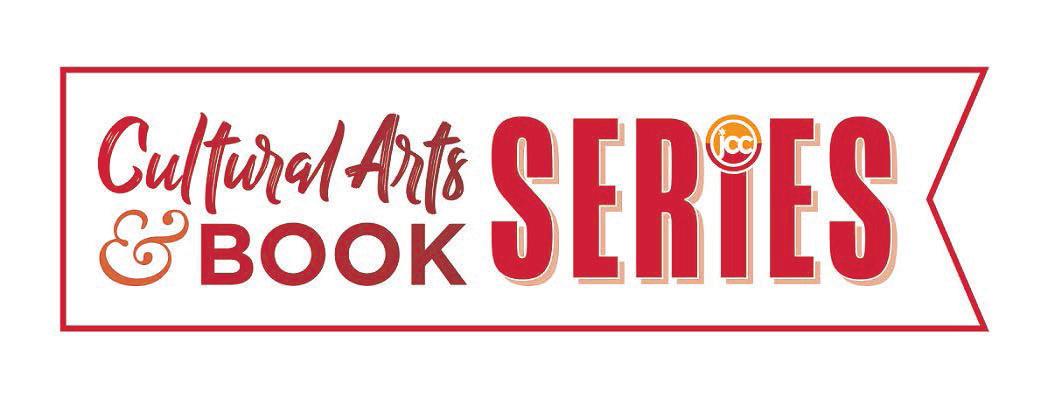
Carillon Brewery 1000 Carillon Blvd, Dayton, 45409 $5 per person. RSVP at jewishdayton.org/events
DAN GRUNFELD


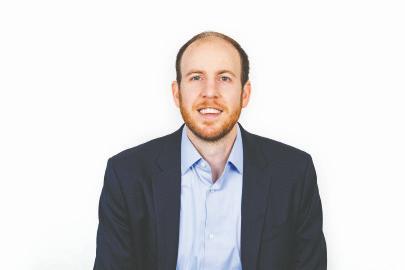

By the Grace of the Game: The Holocaust, a Basketball Legacy and an Unprecedented American Dream
When Lily and Alex entered a packed gymnasium in Queens, New York in 1972, they barely recognized their son. The boy who escaped to America with them, who was bullied as he struggled to learn English and cope with family tragedy, was now a young man who had discovered and secretly honed his basketball talent on the outdoor courts of New York City. That young man was Ernie Grunfeld, who would go on to win an Olympic gold medal and reach previously unimaginable heights as an NBA player and executive. In By the Grace of the Game, Dan Grunfeld, once a basketball standout himself at Stanford University, shares the remarkable story of his family, a delicately interwoven narrative that doesn’t lack in heartbreak yet remains as deeply nourishing as his grandmother’s Hungarian cooking, so lovingly described.
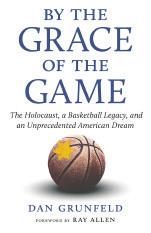
THE DAYTON JEWISH OBSERVER • FEBRUARY 2023 PAGE 15
February
Interviewed by longtime Dayton Daily News sportswriter Marc Katz.
JEWISH FEDERATION of GREATER DAYTON & ITS AGENCIES
February
JEWISH FEDERATION of GREATER DAYTON & ITS AGENCIES
Legacies, Tributes, & Memorials
LINDA W. RUCHMAN
IN LOVING MEMORY OF
ANNUAL CAMPAIGN
IN RECOGNITION OF
› Debbie Feldman’s leadership, with Dayton Children’s ranked #1 on Forbes’ list of Best Employers in Ohio
Mary Rita and Norm Weissman
IN HONOR OF
› Cathy Gardner’s 10 years with the Jewish Federation
Donna and Marshall Weiss
IN MEMORY OF
› Sonna Tuck
Harvey Tuck
UKRAINE EMERGENCY
RELIEF FUND
GET WELL SOON
› Mark Dlott
Sarah Moore Leventhal
ROBERT AND MOLLIE
FITTERMAN PROFESSIONAL DEVELOPMENT FUND
IN LOVING MEMORY OF
› Mollie and Robert Fitterman
Susan and Allan Witte
ISRAEL SUPPORT FUND


IN MEMORY OF
› Beverly Kantor
Je rey Kleinman
DOROTHY B. MOYER YOUNG LEADERSHIP FUND
IN MEMORY OF
› My father, Richard Moyer
Scott Moyer
JEWISH FEDERATION OF GREATER DAYTON ENDOWMENT FUND
IN HONOR OF
› Dr. Marc Sternberg’s retirement
Susie and Eddie Katz
IN HONOR OF
› Debbie and Bruce Feldman
Carol Wolf
BLESSINGS TO
› Barrie Denmark. May your mother’s memory be eternal
Michael Roediger
PERPETUAL ANNUAL CAMPAIGN FUND


IN MEMORY OF
› Beverly Kantor
IN HONOR OF
› Mr. and Mrs. Ralph P. Schwartz’s 40th wedding anniversary
Marshall Ruchman
RESILIENCE SCHOLARSHIP FUND
IN HONOR OF
› Kellie Weckstein, for all the things we do to give wings to the people and ideas creating opportunity in your community
David Strouse
IN MEMORY OF
› Dan Weckstein
Jerold Weckstein
PJ LIBRARY
IN HONOR OF
› Marcia and Eddie Kress’ new grandson, Jude
Cheryl and Rick Carne
JOE BETTMAN MEMORIAL TZADIK AWARD
IN MEMORY OF
› Susan Davis
› Carol Matuso
Jean and Todd Bettman
IN MEMORY OF
› Carol Matuso
Elaine Bettman
IN MEMORY OF
› Beverly Kantor
Andrea Rabiner
Mark Scher
Jodie and Gary Scher
FRIENDS DRIVE
IN MEMORY OF
› Nicole Monique Frilot
Michele and Jay Dritz
IN MEMORY OF
› Shep Rosen
Amy and Ed Boyle
› Debra Saidel
Alice and Burt Saidel
CANTOR DJCC FUND
WISHING A HAPPY CHANUKAH TO
› Sylvia Blum
Debbie Brenner
CAROLE RABINOWITZ CAMP FUND
IN MEMORY OF
› Jim Brisk
› Robert Froning
› Susan Davis
› Tom Borcher Sr.
› Michael Fishbein
Bernard Rabinowitz
EARLY CHILDHOOD FUND
IN MEMORY OF
› Susan Davis
Sarah Moore Leventhal
JOAN AND PETER WELLS AND REBECCA LINVILLE FAMILY, CHILDREN AND YOUTH FUND
IN MEMORY OF
› Beverly Kantor
Joan and Peter Wells
JANE HOCHSTEIN JCC
PROGRAMMING FUND
IN MEMORY OF
› Beverly Kantor
Gayle and Irvin Moscowitz
INNOVATION GRANTS
Contact Tara Feiner at tfeiner@jfgd.net or 937-401-1546 to request an application packet. Completed applications should be emailed to Tara Feiner by noon on Friday, March 31. The application packet includes:
• Innovation Grant application (Adobe PDF) signed by the organization(s) senior o cer.
• Innovation Grant Budget application (Microsoft Excel)
• First-time applicants must supply a copy of the organization’s IRS tax exempt ruling (501(c)(3)) for all groups involved if there is a collaboration. Prior Innovation Grant awardees do not need to resubmit their tax-exempt status.
For more information, visit jewishdayton.org
PAGE 16 THE DAYTON JEWISH OBSERVER • FEBRUARY 2023 FEDERATION JFS JCC
Classes
CALENDAR
Beth Jacob Congregation Zoom Classes: W. Rabbi Agar. Sundays, 2 p.m.: Conversion Class. Tuesdays, 7 p.m:. Weekly Parsha Class. Thursdays, 7 p.m.: Thursdays of Thought-Jewish Law. Sign up at 937-274-2149.
Chabad Classes: Wednesdays, 7 p.m.: Talmud Class in person. Thursdays, noon: Zoom Lunch & Learn. Fridays, 9:30 a.m.: Women’s Class in person. 2001 Far Hills Ave., Oakwood. Register at chabaddayton.com.
Temple Beth Or Classes: Sun., Feb. 5, 12, 26, 12:30 p.m.: Adult Hebrew. Thurs., Feb. 9, 7 p.m.: Chai Mitzvah on Zoom. Fri., Feb. 3, 10 a.m.: Apocryphal Study on Zoom. 5275 Marshall Rd., Wash. Twp. templebethor.com. 937-4353400.

Temple Israel Classes: Tuesdays, noon: Talmud Study. Wednesdays, 10 a.m.: Social Justice Torah Commentary w. Rabbi Bodney-Halasz. Dorothy Lane Market, 6177 Far Hills Ave., Wash. Twp. Saturdays, 9:15 a.m.: Virtual Torah Study. Sat., Feb. 11, 9:15 a.m.: Hybrid Torah Study. 130 Riverside Dr., Dayton. tidayton.org, 937-496-0050.
Family
Temple Israel Prayer & Play: Fri., Feb. 17, 10 a.m. Infants-2nd grade. Contact Rabbi Sobo, educator@tidayton.org. 130 Riverside Dr., Dayton. 937-496-0050.
Children & Teens
Chabad Kids Club Tu B’Shevat Spa: Mon., Feb. 6, 4 p.m. Free. Ages 5-11. W. dinner. chabaddayton.com/ckids. 2001 Far Hills Ave., Oakwood. 937-643-0770.
Jewish Youth Group Ice Skating @ RiverScape: Sat., Feb. 11, 7:30 p.m. $10 includes skate rental. Grades 6-8. jewishdayton.org/events. 237 E. Monument Ave., Dayton.
JCC Winter Camp Shalom: Mon., Feb. 20, 8 a.m.-5:30 p.m. Grades K-10. Temple Beth Or, 5275 Marshall Rd., Wash. Contact Meryl Hattenbach, mhattenbach@jfgd.net, 937-401-1550.
Adults
JCC's A Night in Vegas: Sat., Feb. 18, 7:30 p.m. $36 in advance, $50 at door. RSVP to jewishdayton.org/events. Boonshoft CJCE, 525 Versailles Dr., Centerville. 937-610-1555.
Tu B'Shevat
Temple Anshe Emeth & Beth Jacob Congregation Kabalat Shabbat & Tu B'Shevat/Shabbat Dinner: Fri., Feb. 3, 6 p.m. $18. At Beth Jacob, 7020 N. Main St., Harrison Twp. RSVP to bethjacob1@ aol.com.
Beth Abraham Synagogue Tu B'Shevat Seder: Sat., Feb. 4, noon. 305 Sugar Camp Cir., Oakwood.
Temple Israel Tu B'Shevat Celebration: Sun., Feb. 5, 9:45 a.m.: Ryterband Series presents Marianist Environmental Ed. Ctr.'s Tara Poling, Jewish Bible & Links to the Role of Trees. 11:30 p.m.: Community Tu B'Shevat Seder. Free. RSVP to tidayton.org or 937-496-0050.

Chabad Women’s Circle Tu B’Shevat Dinner: Sun., Feb. 5, 6:30 p.m. $36. RSVP to dlmdayton@gmail.com. 2001 Far Hills Ave., Oakwood.
Community
Beth Abraham Synagogue Zoom w. Ethnomusicologist Rachel Adelstein: Thurs., Feb. 2, 7 p.m. Israel Goldfarb, Shalom Aleichem, & the Search for Nusach America. Link at bethabrahamdayton.org.
Chabad Israeli Shabbat Dinner: Fri., Feb. 3, 5:30 p.m. $25 adult, $10 child or student. 2001 Far Hills Ave., Oakwood. chabaddayton.com/rsvp. 937-643-0770.
Dayton Jewish Chorale Shabbat Shira Service: Fri., Feb. 3, 6 p.m. Potluck dinner to follow. $5 adult, $3 4 - 12, free 3 & under. RSVP to info@attidayton.org. At Temple Israel, 130 Riverside Dr., Dayton.
Temple Israel Ryterband Brunch & Lecture Series: Sundays, 9:45 a.m. $7. Feb. 5: Marianist Environ. Ed. Ctr.'s Tara Poling, Jewish Bible Links to the Role of Trees. Feb. 12: Rabbi/Educator Tina Sobo, Progressive Halacha. Feb. 26: Dayton Holocaust Committee Chair Renate Frydman, A Reason for Survival - To Understand, To Educate, To Heal (in partnership w. Beth Abraham). 130 Riverside Dr., Dayton. 937-496-0050.
Beth Abraham Men’s Club Rick Pinsky Brunch Speaker Series: Sundays. $7. Feb. 5, 10 a.m.: Dayton Jewish Observer's Marshall Weiss, Jewish Connections to the Titanic. Feb. 19, 10 a.m.: Attorney Larry Burick, Religious Freedom in the Roberts Court - Good or Bad for the Jews? Feb. 26, 9:45 a.m. at Temple Israel, 130 Riverside Dr., Dayton: Dayton Holocaust Committee Chair Renate Frydman, A Reason for Survival - To Understand, To Educate, To Heal. 305 Sugar Camp Cir., Oakwood. 937-293-9520.
Temple Beth Or Friends & Family CPR/First Aid & Stop the Bleed Courses: Sun., Feb. 19, 10 a.m., CPR/ First Aid. Noon, Stop the Bleed Course. Both courses free. RSVP at templebethor.org. 5275 Marshall Rd., Wash. Twp.
JCC Youth Theatre’s Newsies Jr.: Sat., Feb. 25, 8 p.m. Sun., Feb. 26, 2 p.m. & 6 p.m. Adults $18, children 4-13 $15. daytonlive.org/venues/arts-annex. PNC Arts Annex, 46 W 2nd St, Dayton.
JFS Drive-Thru Mitzvah Mission: Sun., Feb. 26, 10 a.m.-noon. For info., call Jacquelyn Archie, 937-610-1555. Boonshoft CJCE, 525 Versailles Dr., Centerville.
Friday, February 3 at 6:00PM
Join the Dayton Jewish Chorale at Temple Israel for Shabbat Shirah – the Sabbath of Song!



This musical Shabbat service celebrates the continued return of the Dayton Jewish Chorale. No reservations are required for the service. To stay for the potluck dinner following, RSVP by Feb. 1 to info@tidayton.org. Cost is $5/adult, $3/child ages 4-12, and free for children 3 and younger.
Join
9:45AM - Tara Poling, Program Director of the Marianist Environmental Education Center (MEEC), will share reflections on wisdom from the Tanakh that can inform our response to contemporary environmental challenges.
This presentation is part of the Ryterband Series.






11:30AM - Community Tu B’Shevat Seder Join

THE DAYTON JEWISH OBSERVER • FEBRUARY 2023 PAGE 17
Temple Israel • www.tidayton.org • 937.496.0050 130 Riverside Drive, Dayton, OH 45405 A Reform Synagogue open to all who are interested in Judaism
us on Sunday, February 5 for a special Tu B’Shevat Celebration!
us for a FREE seder sponsored by the Adult Education Committee. RSVP to Temple by Feb. 1
the
SHABBAT SHIRAH with
A native Daytonian now living in Bonita Springs, Fla., Nat Ritter lovingly calls his plots in Temple Israel’s cemetery the “only real estate I own in Dayton.”
When Nat’s first wife, Wendy, died in 2008, both he and Wendy’s family wanted her to be buried in Dayton, where they found the cemetery to be peaceful and serene. Along with that came a commitment that she wouldn’t be left alone.
But it was more than this commitment that motivated Nat to contribute to the Jewish Cemeteries of Greater Dayton campaign. With both of his parents buried in Beth Abraham’s cemetery, he felt it was his turn to care for the generations that came before him.
As a child of Holocaust survivors, Nat knew how precious his family was. Etched on the back of his parents’ tombstone is a remembrance “for all our family lost in the Holocaust.” “No one knows when they died or where they are buried. For my family, Dayton’s Jewish cemeteries act as their final resting place. We need to make sure that they are taken care of properly.”
Now married for 11 years to Susan, they feel “a strong connection to their Jewish friends and family in Dayton.” Even though they now live in Florida, they thoughtfully care for their Jewish heritage in Dayton.

Jewish Cemeteries of Greater Dayton is an endowment organization created to maintain our three Jewish cemeteries in perpetuity. Please join us as we strive to maintain the sanctity, care, and integrity of these sacred burial grounds.

Preserving our Past Ensuring Our Future
daytonjewishcemeteries.org
RELIGION
Queer artists reimagine Jewish ritual garments
By Jackie Hajdenberg, JTA
Binya Kóatz remembers the first time she saw a woman wearing tzitzit. While attending Friday night services at a Jewish Renewal synagogue in Berkeley, she noticed the long ritual fringes worn by some observant Jews — historically men — dangling below a friend’s short shorts.
“That was the first time I really realized how feminine just having tassels dangling off you can look and be,” recalled Kóatz, an artist and activist in the Bay Area. “That is both deeply reverent and irreverent all at once, and there’s a deep holiness of what’s happening here.”
Since that moment about seven years ago, Kóatz has been inspired to wear tzitzit every day. But she has been less inspired by the offerings available in online and brick-and-mortar Judaica shops, where the fringes are typically attached to shapeless white tunics meant to be worn under men’s clothing.
So in 2022, when she was asked to test new prototypes for the Tzitzit Project, an art initiative to create tzitzit and their associated garment for a variety of bodies, genders and religious denominations, Kóatz jumped at the chance. The project’s first products went on sale in December.
“This is a beautiful example of queers making stuff for ourselves,” Kóatz said. “I think it’s amazing that queers are making halachically sound garments that are also ones that we want to wear and that align with our culture and style and vibrancy.”
Jewish law, or halacha, requires that people who wear four-cornered garments — say, a tunic worn by an ancient shepherd — must attach fringes to each corner. The commandment is biblical: “Speak to the Israelite people and instruct them to make for themselves fringes on the corners of their garments throughout the ages” (Numbers 15:37-41)
When garments that lack corners came into fashion, many Jews responded by using tzitzit only when wearing a tallit, or prayer shawl, which has four corners.
But more observant Jews adopted the practice of wearing an additional four-cornered garment for the sole purpose of fulfilling the mitzvah (commandment) to tie fringes to one’s clothes. Called a tallit katan, or small prayer shawl, it's designed to be worn under one’s clothes and can be purchased at Judaica stores or online for less than $15. The fringes
represent the 613 commandments of the Torah, and it is customary to hold them and kiss them at certain points while reciting the Shema prayer.
“They just remind me of my obligations, my mitzvot, and my inherent holiness,” Kóatz said. “That’s the point, you see your tzitzit and you remember everything that it means — all the obligations and beauty of being a Jew in this world.”
The California-based artists behind the Tzitzit Project had a hunch the ritual garment could appeal to a more diverse set of observant Jews than the Orthodox men to whom the mass-produced options are marketed. Julie Weitz and Jill Spector had previously collaborated on the costumes for Weitz’s 2019 My
CONGREGATIONS
Beth Abraham Synagogue
Conservative Rabbi Aubrey L. Glazer Cantor/Dir. of Ed. & Programming Andrea Raizen
Fridays, 5 p.m. Saturdays, 9:30 a.m. 305 Sugar Camp Circle, Oakwood. 937-293-9520. bethabrahamdayton.org
Beth Jacob Congregation Traditional Rabbi Leibel Agar Saturdays, 9:30 a.m. Evening minyans upon request. 7020 N. Main St., Dayton. 937-274-2149. bethjacobcong.org
Temple Anshe Emeth Reform
Rabbinic Intern Anna Burke 320 Caldwell St., Piqua. Contact Steve Shuchat, 937-7262116, ansheemeth@gmail.com. ansheemeth.org
Temple Beth Or Reform
Fridays, 6:30 p.m.
Rabbi Judy Chessin
Asst. Rabbi/Educator Ben Azriel 5275 Marshall Rd., Wash. Twp. 937-435-3400. templebethor.com
Temple Beth Sholom Reform
Rabbi Haviva Horvitz 610 Gladys Dr., Middletown. 513-422-8313. templebethsholom.net
Temple Israel Reform
Senior Rabbi Karen BodneyHalasz Rabbi/Educator Tina Sobo
Golem performance art project that uses the mythical Jewish creature to explore contemporary issues. In one installment of the project focused on nature, Prayer for Burnt Forests, Weitz’s character ties a tallit katan around a fallen tree and wraps the tzitzit around its branches.
“I was so moved by how that garment transformed my performance,” Weitz said, adding that she wanted to find more ways to incorporate the garment into her life.
The Tzitzit Project joins other initiatives meant to explore and expand the use of tzitzit. A 2020 podcast called Fringes featured interviews with a dozen trans and gender nonconforming Jews about their experiences with Jewish ritual garments. Kóatz was a guest. Meanwhile, an online store, Netzitzot, has since 2014 sold tzitzit designed for women’s bodies, made from modified H&M undershirts.
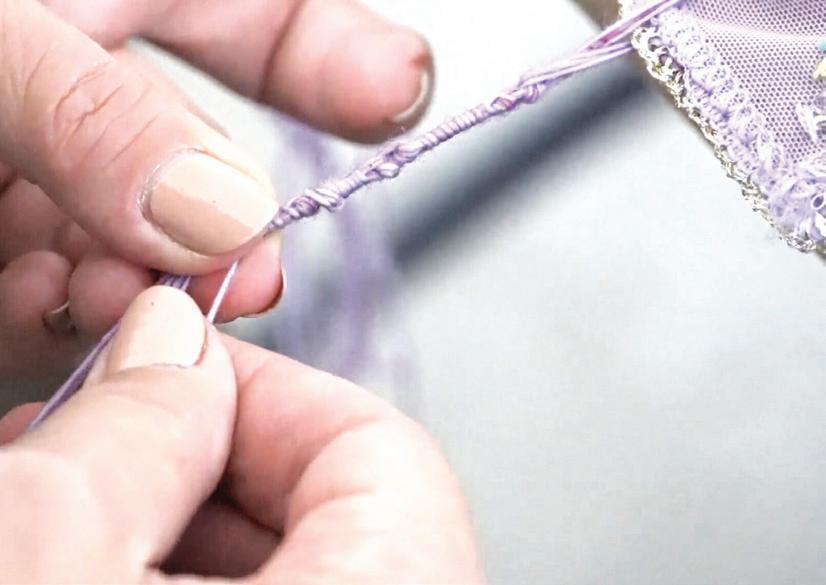
The Tzitzit Project goes beyond and sells complete garments that take into account the feedback of testers including Kóatz — in three colors and two lengths, full and cropped, as well as other customization options related to a wearer’s
Fri., Feb. 3, 6 p.m.
Fridays, Feb. 10, 17, 24, 6:30 p.m. Sat., Feb. 11, 10:30 a.m. 130 Riverside Dr., Dayton. 937-496-0050. tidayton.org
Temple Sholom Reform
Rabbi Cary Kozberg 2424 N. Limestone St., Springfield. 937-399-1231. templesholomoh.com
ADDITIONAL SERVICES
Chabad of Greater Dayton
Rabbi Nochum Mangel
Associate Rabbi Shmuel Klatzkin
Youth & Prog. Dir. Rabbi Levi Simon. Beginner educational service Saturdays, 9:30 a.m. 2001 Far Hills Ave. 937-643-0770. chabaddayton.com
Yellow Springs Havurah
Independent Antioch College Rockford Chapel. Contact Len Kramer, 937-5724840 or len2654@gmail.com.
PAGE 18 THE DAYTON JEWISH OBSERVER • FEBRUARY 2023
525 Versailles Drive • Centerville, OH 45459
‘We feel a strong connection to our Jewish friends and family in Dayton.’
27
— Nat & Susan Ritter
Continued on Page
The Tzitzit Project
Artist Julie Weitz ties the knots of the tzitzit, fringes attached to the corners of a prayer shawl or the everyday garment known as a tallit katan.
Jonah Ian Dritz, son of Michele and Jay Dritz, will be called to the Torah as a bar mitzvah on Feb. 11 at Temple Israel. He is the brother of Hannah Dritz, grandson of Phyllis and Robert Dritz, and Cindy and Rod Frilot, and the great-grandson of Sophie Smith as well as Jeannette Dritz of blessed memory and Irwin Dritz of blessed memory. He is also loved by countless aunts, uncles, cousins, and family throughout the country and around the world. Jonah is in seventh grade at The Miami Valley School and is involved in soccer and other sports, Quiz Bowl, and spending time with friends. He enjoys participating in various Jewish youth programs with the temple, JCC and Jewish Federation, and during the summer always looks forward to his time at Camp GUCI in Indiana. Jonah also loves animals — including his 3 cats — and he chose a bar mitzvah project working with animals at 4 Paws for Ability, a local organization that trains and places service dogs

Beth Abraham Synagogue will celebrate women who provide spiritual leadership in the Dayton area at this year's Women of Valor luncheon, May 10.
Honorees are Rabbi Karen BodneyHalasz, Rabbi Judy Chessin, Courtney Cummings, Cantor Andrea Raizen, Mary 'Mahira' Rogers, and Rabbi Tina Sobo. Event chairs are Mindy Greene and Janice Krochmal.
Among the artists participating in Women Strong Art Project's What ABOUT Hair exhibit at the Dayton Metro Library's Main Library is Elyssa Wortzman. The exhibit runs through Feb. 25 on the library's second floor. Elyssa arrived in Dayton in September with her husband, Rabbi Aubrey L. Glazer, now Beth Abraham Synagogue's rabbi.
Renate Frydman's book, Anschel's Story, is now available via Amazon as an audiobook. The Dayton Holocaust Resource Center's founder and director, Renate published Anschel's Story in 2017. It's her late husband's story of survival in Nazi-occupied Poland. Told in the first person, the book relates how Anschel “Charlie” Frydman stayed
Jonah Ian Dritz with children, veterans, and adults with disabilities who wish to have extra love, companionship, and independence.
alive as a slave laborer and then as a partisan fighter, when he was only a youth, after his parents and two sisters were murdered.
National Conference for Community and Justice Executive Director Adriane Miller tells us registration is open for its spring and summer Anytown programs. The Anytown Spring Retreat, March 3-5, is a free, weekend-long, overnight program for high school students in the Miami Valley, focused on leadership and allyship through the lens of diversity, equity, and inclusion. Anytown's Summer Institute, June 11-16, is a free, week-long, overnight program for area high school students to engage in conversations, education, and activities about diversity, equity, and inclusion issues. Participants engage in activities around race, gender, ability/disability, class, and allyship. "If you know of any high school students who are looking to join a life-changing, eye-opening experience, Anytown is just that," Adriane says. For details or to register, go to nccjgreaterdayton.org/anytown.
Send your Mazel Tov announcements to mweiss@jfgd.net.
Torah Portions

Shabbat Candle Lightings


February 3: 5:41 p.m.
February 10: 5:49 p.m.
February 17: 5:57 p.m.
February 24: 6:05 p.m.
February 4: Beshalach (Ex. 13:17-17:16)
February 11: Yitro (Ex. 18:1-20:23)
February 18: Mishpatim (Ex. 21:1-24:18)
February 25: Terumah (Ex. 25:1-27:19)
THE DAYTON JEWISH OBSERVER • FEBRUARY 2023 PAGE 19
MAZEL TOV!
Tu B’Shevat New Year for Trees February 6/15 Shevat Marks springtime in Israel. Celebrated with picnics, fruit and planting trees.
February Shevat/Adar
CW Events at the Dayton Arcade
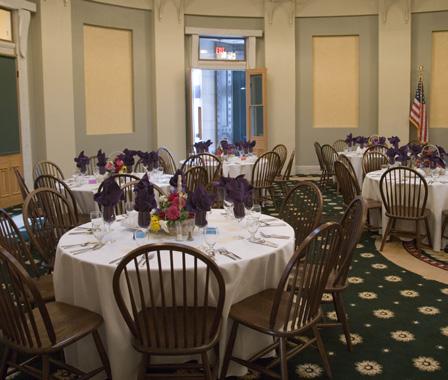
A celebrated architectorial gem since the turn of the century, the Dayton Arcade has been meticulously restored and is ready to host your next special event.


CW Events at the Dayton Arcade, brought to you by Culture Works, is booking performances, weddings, fundraisers, and unique experiences for 2023 and beyond We would be honored to celebrate with you!


 Shannon Lindenauer, Events Director (937) 222-ARTS x105 • events@cultureworks org
Shannon Lindenauer, Events Director (937) 222-ARTS x105 • events@cultureworks org

@DaytonArcadeEvents
A Jewish wedding checklist
By Gabrielle Kaplan-Mayer myjewishlearning.com
If you or someone close to you is planning a Jewish wedding, you are in the midst of an exciting — and at times stressinducing — experience. Besides the many wedding details that all couples need to plan, Jewish brides and grooms have several other important factors connected to their ceremony to consider. Whether you are Jewishly knowledgeable or relatively new to Judaism, this checklist will help you plan a meaningful Jewish wedding.
1. Choosing a date
Jewish weddings are traditionally prohibited on Shabbat and most holidays — including Rosh Hashanah, Yom Kippur, Passover, Shavuot, and Sukkot — and the fast days Tisha B’Av, the 10th of Tevet, the 17th of Tammuz, the Fast of Gedaliah, and the Fast of Esther. Traditionally, Jewish weddings are not held during the counting of the Omer between Passover and Shavuot, although customs differ as to whether that entire seven-week stretch or just part of it is a problem. Marrying during the three
weeks between the 17th of Tammuz and Tisha B’Av is also prohibited in traditional Jewish practice. Because many of these dates fall during prime wedding season (spring-summer), it’s important to check a Jewish calendar before you select a date.
Although Shabbat weddings are out, many couples choose to wed on Saturday after sundown, so that they can begin their ceremony with Havdalah, marking both the end of Shabbat and the end of the time that came before their public commitment to one another.
Some couples choose to wed on Tuesdays, believing it to be an especially blessed day, since in the Torah narrative of creation, the phrase “God saw that it was good” appears twice on the third day.
lege Hillel or Chabad that they are close to. But for engaged couples who are not affiliated with a Jewish community in a formal way, finding a rabbi to lead their wedding ceremony can seem a daunting task. Parents may suggest using a rabbi from their congregation, whether or not the couple knows them.
It’s important to know that a rabbi is not the only person who can lead a Jewish wedding. A cantor can officiate too. You may want to begin the search for your officiant by visiting local congregations and observing how different rabbis and cantors lead services.
Rabbis' and cantors' schedules fill up quickly, so if you have a particular clergy member in mind, clear the date with him or her as soon as possible.
2313 Far Hills Ave., Oakwood 937-293-1196
www.oakwoodflorist.com family owned and operated military discount
2. Selecting an officiant
For some couples, this is an easy one. They may be active members of a congregation or have a rabbi from their col-
Carillon Park Events







Interfaith couples who encounter difficulties finding a rabbi can contact 18doors.org, which works with interfaith couples and can help them to find a rabbi.
When you meet with officiants you are considering, be sure to ask them their philosophy about leading weddings, if they are open to adapting rituals, and what kind of ketubah (marriage contract) text they prefer that couples use. Make sure that you are on the same page about major issues from the start.
3. Planning the ceremony
Even couples who grew up in a Jewish home with years of Jewish education may find themselves surprised when it comes to examining traditional Jewish wedding rituals.

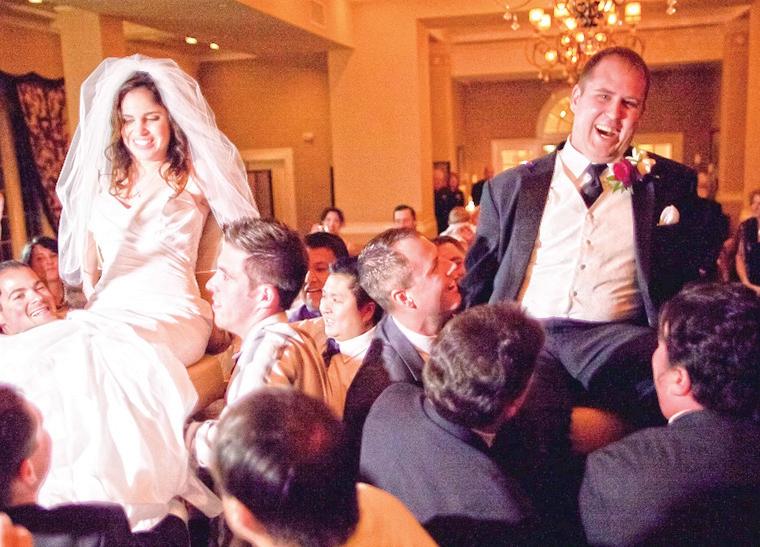
For example, in a traditional ceremony, only the groom gives the bride a ring, an act which is thought to symbolize kinyan (acquisition).
Egalitarian couples find this

PAGE 20 THE DAYTON JEWISH OBSERVER • FEBRUARY 2023
FengLong Photography/Flickr From intimate ceremonies to large receptions, Dayton History’s venues offer an extraordinary combination of natural beauty and unique locations that will make your special event truly memorable!
E V E N T S T H A T M A K E H I S T O R Y Please contact us at 937-293-2841 ext. 415 or events@daytonhistory.org Carillon Historical Park • daytonhistory.org • 1000 Carillon Blvd., Dayton, OH Now exclusively working with Bernstein’s Fine Catering Contact Patty Caruso at plhc69@gmail.com to advertise in The Observer.
ritual not in keeping with their values and choose to do a double-ring ceremony. Some Orthodox rabbis will allow a modified form of this. While working with a rabbi or cantor can help you learn about the wedding rituals, you will probably get more out of the experience by doing a bit of research, so you can bring ideas to your meetings with the rabbi.
4. Choosing a ketubah
Just as county governments issue marriage licenses, Jewish law has historically used a ketubah to sanction a marriage. Ketubah means writing or written and refers to the document that is signed by witnesses before and often read during a Jewish wedding. Traditionally, a ketubah served as a kind of premarital contract, outlining a bride’s ongoing rights: food, clothing, and even sex should be provided during the course of the marriage. The ketubah also specified her rights in the case of her husband’s death or their divorce.
Couples that veer away from the traditional ketubah text and its implications choose a text that expresses their hopes and commitments for their marriage. Some couples write their own text, while others search for a text that speaks to their vision.
The ketubah is not only a legal document, but also an artistic one. Ketubot (plural of ketubah) have long been — and continue to be— an expression of Jewish creativity. So couples not only can have decisions to make about the text, but also the kind of art they want for their ketubah. Some couples shop together for a lithograph; others hire an artist to create an original design.
Couples should also think about who they want to invite to sign their ketubah. Traditionally, a witness must be a religiously observant Jewish male, unre-
lated to the bride or groom. Reform and Reconstructionist and some Conservative rabbis accept women as witnesses, though most still prefer that the witness be Jewish.
5. Selecting a chupah
The chupah is the canopy that covers the bride and groom during the wedding ceremony, creating a sacred space that is both open for all to see and private and intimate for the couple beneath it. It symbolizes their new home together, and is said to be open on all sides, as was the tent of Abraham and Sarah, who were always ready to receive visitors.
In planning your wedding, think about what kind of chupah would be special for you. Some are covered in flowers, others are made of fabric squares that friends and family decorate for the couple. The chupah is attached to four poles, which can be freestanding or held by four people. It is considered a great honor to hold a chupah pole, so this should be given to people very close to the bride or groom.
6. Including ritual objects
Jewish weddings call for some objects that, with a little thought, can be enhanced to create special meaning for your wedding. For example, at most Jewish weddings, kipot (skullcaps) are provided for guests. Many couples have them imprinted with their name and wedding date; others knit original kipot or paint or decorate satin or felt ones to match wedding decor.
Couples also need a Kiddush cup for under the chupah. Some couples create a new tradition, using one heirloom cup from each family. And no Jewish wedding is complete without the glass for breaking at the end of the ceremony. Today’s couples sometimes save the pieces of their broken glass to be transformed
into a new piece of Judaica, such as a mezuzah or candlesticks.
7. Pre-wedding choices


One of the greatest things about Jewish weddings is that the celebration is spread out over time, giving you maximum opportunities to honor the bride and groom.
The celebration may begin with an aufruf, when bride and groom (in traditional circles, only groom) are called for an aliyah to the Torah. They receive a misheberach blessing, which invokes God’s blessing for the bride and groom, and then they are showered with candy, a symbol of the sweetness to come in their life together.
Many couples host a kiddush lunch following services. This can be an ideal time to include the entire community in your wedding joy.

You and your partner should also discuss whether you want to include various traditional pre-wedding rituals such as going to the mikvah (ritual bath), separating from one another during the week before your wedding, and fasting on your wedding day. These rituals can help the couple prepare spiritually for the seriousness of the day to come.
While a Jewish wedding is full of joy, it is also like a personal Yom Kippur for the bride and groom, who want to enter their marriage with a pure heart. Some couples choose to follow an altered version of some of these traditions, such as eating something light before the ceremony to protect against fainting.
Give yourselves ample time to talk through these steps and to use the wedding-planning process as an opportunity to learn more about Jewish traditions and the way each of you envisions your life together once you step out from under the chupah, hand in hand.

THE DAYTON JEWISH OBSERVER • FEBRUARY 2023 PAGE 21
Ugly Chanukah sweaters brought this D.C. power couple together
By Alix Wall, JTA
Years before they were a couple, Shelley Greenspan and Reuben SmithVaughan were just two Amazon employees wearing ugly Chanukah sweaters to a company holiday party.
Both were working in Amazon’s Washington, D.C. office in 2017 when they each donned their sweaters — Greenspan in a hot pink number with a sparkly blue and gold dreidel; SmithVaughan with a blue and neon green Star of David emblazoned across his chest — for the annual holiday party. As they remember it, they were the only two attendees in Chanukah sweaters.
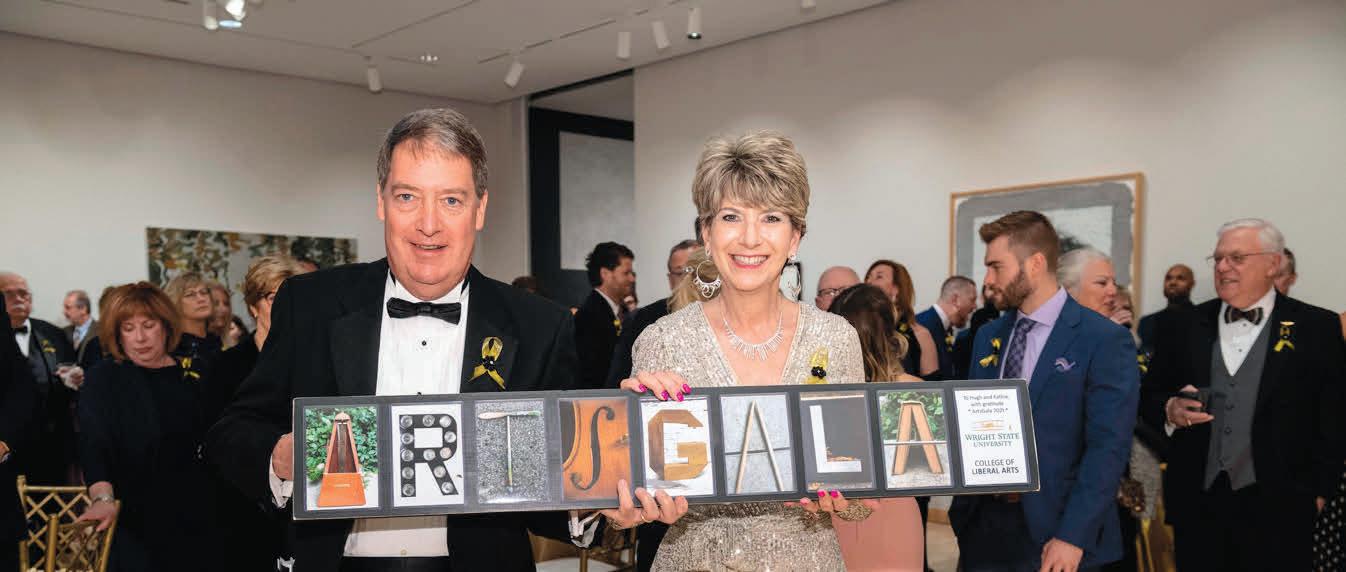

But while they shared their amusement with each other, any sparks remained confined to Greenspan’s sweater.
“It did give her the knowledge that I was Jewish,” Smith-Vaughan said, noting that his ethnicity is not obvious from his name.
“And not someone just Jewish, but proud enough about it to wear a sweater to a holiday party,” Greenspan added.
Five years later, Greenspan helped to plan Chanukah gatherings of her own, as the White House liaison to the Jewish community. And she and SmithVaughan are married. But the path to
both roles was hardly straightforward.
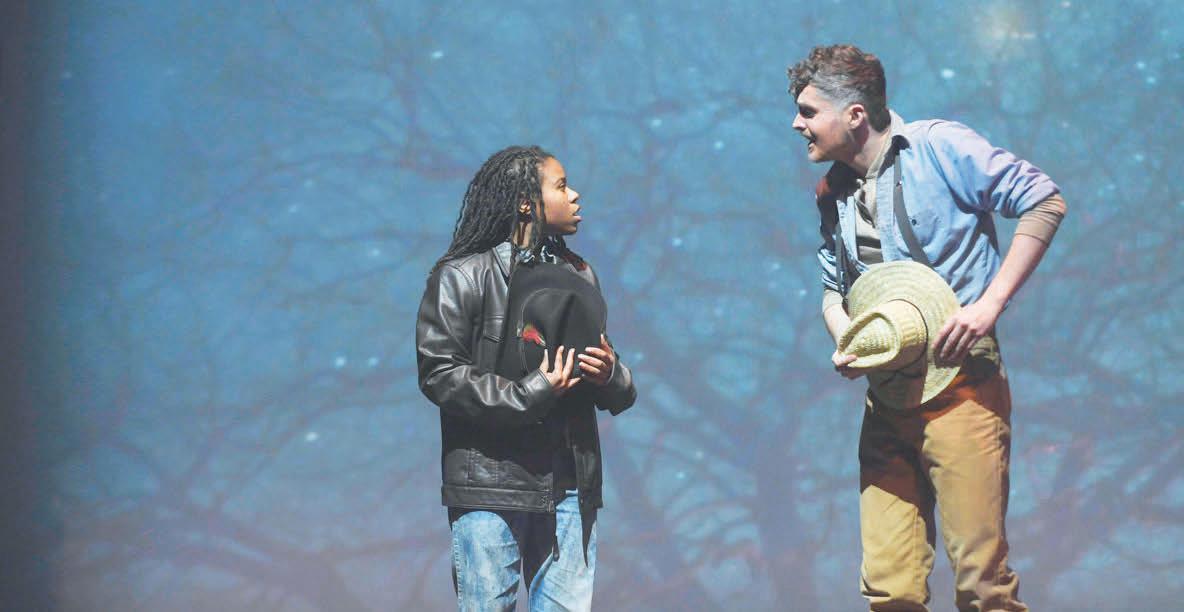
The year after the Amazon Chanukah, Greenspan took a job with the State Department and lost touch with her sweater buddy. That lasted until April 2020, when, isolated at home at the start of the pandemic, the pair matched on the dating app Bumble.
For their first date, which happened over Zoom, SmithVaughan asked about her cocktail preference in advance, then dropped two small bottles of gin and tonic at her building’s lobby by bike. Back at home, he poured himself a bourbon, and they video-chatted over drinks.
There was an immediate connection, despite their very different Jewish upbringings.
Greenspan, 32, is originally from Miami Beach. She attended a Reform synagogue, a Conservative overnight camp, and an Orthodox day school growing up before spending the year after high school in Israel, through Young Judea’s gap year program.

After graduating from the University of Florida, she entered the corporate
world and then politics, working on both Hillary Clinton’s presidential campaign and Jewish Women for Joe in the Biden campaign.
Smith-Vaughan, 34, grew up on a coffee farm in Nicaragua, in a Jewish community so tiny “we were taken out of school when someone passed away to make a minyan,” or prayer quorum
required for mourners, he recalled.
His bar mitzvah was held at the nearest functioning synagogue, 250 miles away in San José, Costa Rica. His father, Arturo Vaughan, serves as the Israeli honorary consulate in Managua, Nicaragua.
A graduate of American University, he is still at Amazon, now the director
PAGE 22 THE DAYTON JEWISH OBSERVER • FEBRUARY 2023
SUNBELT Business Advisors of Southwest Ohio ® WHETHER SELLING YOUR BUSINESS NOW OR IN THE FUTURE, YOU NEED EXPERTISE YOU CAN TRUST Call today for a confidential, no-cost, no-obligation consultation and to receive your free Broker Opinion of Value, a custom evaluation of your company’s value—the most important starting point for any owner thinking of selling. Understand what you have today to secure a better tomorrow (937) 866-4611 dayton@sunbeltnetwork.com sunbeltnetwork.com/dayton-oh 1129 Miamisburg Centerville Rd, Ste 200 Dayton, OH 45449 Selling a business is often the most important financial decision in an owner’s life, which is why you need experienced business brokers you can trust. Sunbelt Business Advisors of Southwest Ohio will assist you every step of the way with exceptional integrity, professionalism, and confidentiality, to build value and allow you to exit at the right time and with the right price. “Sunbelt Business Advisors helped me reach my desired goal. You can trust them with your company.” B. C., Recent Seller Saturday, April 1, 2023 Tickets Available Now! Enjoy concerts, plays, and art showings all season long. wright.edu/ArtsGala Visit wright.edu/ArtEvents to learn more.
Shelley Greenspan and Reuben Smith-Vaughan were married Sept. 18 at the Salamander Hotel in D.C.
Emily Blumberg Photography
of Latin America public policy.
Their courtship followed the earlypandemic playbook, which Smith-Vaughan said “speeded things up really aggressively.” On their second date, they played tennis outdoors. On their third, he cooked dinner at her apartment, but they remained far away from each other.
By the fourth date, at her apartment, they broached the conversation about whether to date exclusively — or, in the lingo of the moment, whether to “pod” together.
“No one knew how to date during Covid — there was this ‘let’s all figure it out together,’” Greenspan recalled. She added, “There was never any ‘What are you doing tonight?’ because no one ever had any plans then.”
Road trips became a favorite way to spend time. It was after a jaunt to Bar Harbor, Maine that Greenspan realized she didn’t want to see SmithVaughan go home.




Meanwhile, he said he knew she was the one when he found out that she always carries a Washington Nationals baseball cap in her bag — he is a major fan.
“Shelley is the most caring, loving, kind and elegant human being I’ve ever met,” Smith-Vaughan said. “She is kind to a fault, always wanting to help people.”
“Reuben is the most honorable person I know,” Greenspan said. “His presence feels like home to me. He’s so optimistic and joyous and positive, his energy is infectious.”
In November 2021, during a Thanksgiving trip to North Carolina, where SmithVaughan’s mother lives, he proposed on the tennis court.
While wedding planning can be all-consuming, Greenspan said she had a particularly “absurd” few months when it overlapped with her new job.
The position requires someone knowledgeable about Jewish communal life and able to represent the disparate viewpoints held by American Jews to the White House, as well as represent the administration to American Jews.

“I’d be calling rental companies while going into briefings in the White House," she said.


The couple were married Sept. 18 by Rabbi Aderet Drucker, executive director and community rabbi of the D.C.-based Den Collective, a nondenominational spiritual community organization, at the District’s Salamander Hotel.
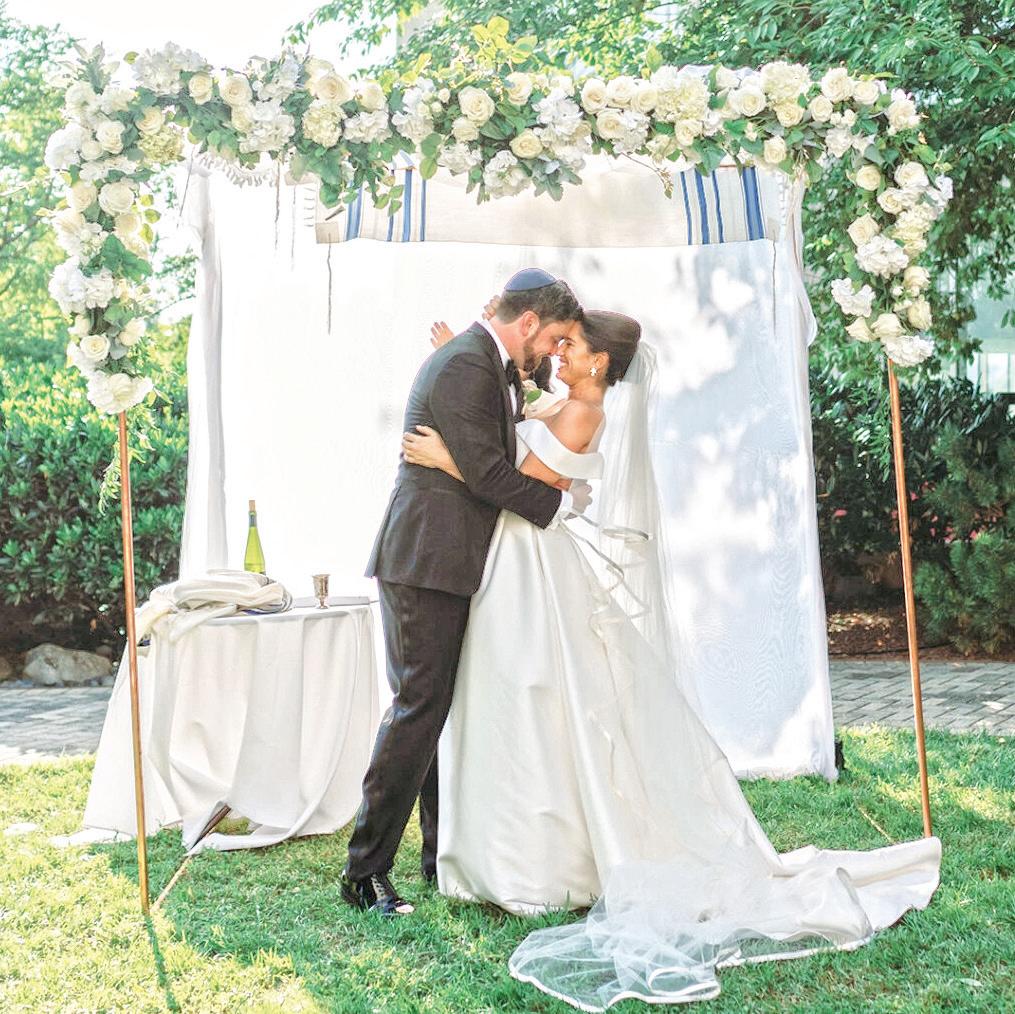

Their wedding weekend began with a Shabbat dinner at Compass Coffee’s roastery,
which is co-owned by a Jewish veteran, and honored the groom’s coffee-farm upbringing.


On Saturday, guests could attend a Nationals game — against the Miami Marlins, the bride’s hometown team. The group was allowed onto the field before the game.
Their custom kipot featured a print of the D.C. skyline in the lining, and the groom and men in the wedding party all wore White House cufflinks with Biden’s signature (available at the White House gift shop). Their custom ketubah features coffee beans, the D.C. skyline, and barbed wire, to honor the bride’s Holocaust-survivor grandparents.
The reception didn’t only feature toasts and dancing; the bride offered a d’var Torah (a word of Torah), and when the groom joined her to thank everyone for coming, he surprised her by singing Eshet Chayil, A Woman of Valor, which Jewish men traditionally sing to their wives before Shabbat dinner.
“Reuben has a beautiful voice and doesn’t really sing in public very much,” Greenspan said. “I wasn’t expecting it and it was so meaningful to me, there wasn’t a dry eye in the house. He still sings it to me every Friday.”
THE DAYTON JEWISH OBSERVER • FEBRUARY 2023 PAGE 23 An American Story of Romantics and Modernists in the West February 18–May 21, 2023 Buy your tickets now! or call 937-223-4ART (4278) Clockwise from top: E. Martin Hennings (American, 1886–1956), Beneath Clouded Skies about 1922, oil on canvas.Tia Collection, Santa Fe. Beulah Stevenson (American, 1890–1965), Camino del Monte Sol 1947, oil on board,Tia Collection, Santa Fe, New Mexico. Robert Henri (American, 1865–1929), Lucinda 1917, oil on canvas.Tia Collection, Santa Fe. Katherine Farrell (American, 1857–1951), Untitled (New Mexico Churchyard), about 1940, oil on canvas.Tia Collection, Santa Fe. New Beginnings 2023 DAI Season Opens with THEFLOWERSHOPPE.COM 937-224-7673 DAYTON OH 45419 2977 FAR HILLS AVE Corner of Far Hills & Dorothy Lane 1306 Troy Street • Dayton, Ohio 45404 937-223-1213 • furstflorist.com Bring in this ad and receive $10 off your next in-store purchase of $60 or more* Expires 4.30.2023. *Some exclusions apply. Not valid on wine, candy, or delivery.
'Shelley is the most caring, loving, kind and elegant human being I’ve ever met,' Smith-Vaughan said. 'She is kind to a fault, always wanting to help people.'
Serving Ohio, Kentucky and Indiana COMMERCIAL • INDUSTRIAL • GOVERNMENT RE-ROOFING / NEW CONSTRUCTION 937-298-1155 www.commandroofing.com INSPECTIONS • ROOF REPAIRS • MAINTENANCE PROGRAMS Firestone - Johns Manville - Carlisle - Soprema 24-Hour Emergency Roof Leak & Repair Service After 6:00 PM/Weekends - Call 937-604-2922 ROOFING ••COMMAN D Email: info@commandroofing.com 2485 Arbor Blvd., Dayton, OH 45439 Contact Patty Caruso at plhc69@gmail.com to advertise in The Observer.
Just weeks ago in upstate New York a deadly blizzard trapped many, among them Jay Withey. Venturing out in his truck to rescue a friend, Jay picked up two stranded pedestrians. Eventually, cemented in a snowbank with his fuel depleted, Jay sought shelter
Candace R. Kwiatek
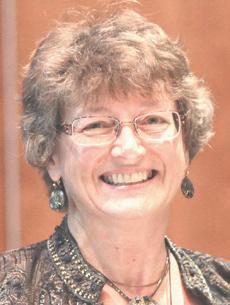
at nearby houses. Despite his pleas, every homeowner refused. Desperate, he broke into a nearby school to shelter his two passengers in the heated building. He then went back outside to collect those stuck in snowbound cars scattered nearby. For two days, 24 people and two dogs lodged safely in the school. Before leaving, Jay left a note apologizing for the break-in.
In commenting on this dramatic episode, talk-show host Dennis Prager noted the contrasting responses of Jay and the homeowners. “How would you or I have reacted?” Prager mused. “While we can never know for sure, I have a theory.
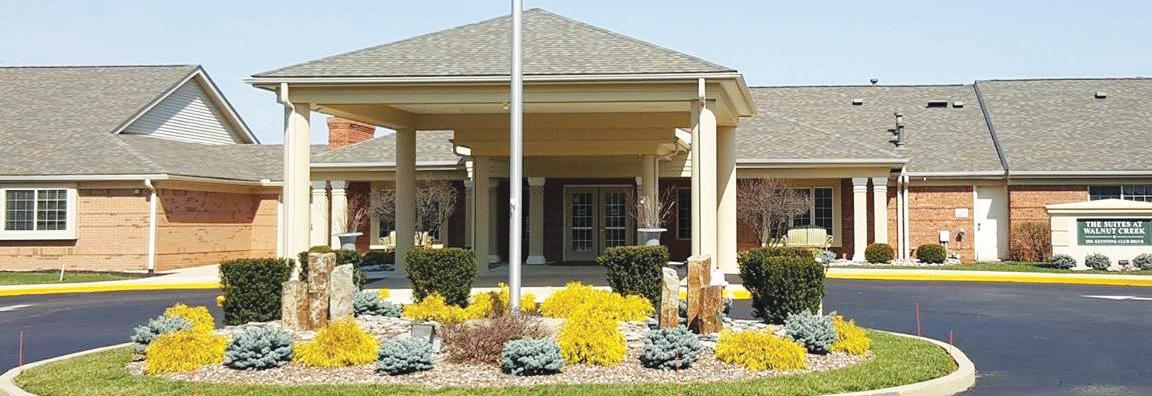
You can train yourself morally in advance of a test.”
According to psychologists and neuroscientists, moral behavior is a complex of at least four distinct processes: moral sensitivity, judgment and reasoning, motivation, and implementation, all of which develop independently.
While Darwin argued that morality is innate, scientist Darcia Narvaez notes that modern research disagrees. “It now appears that the moral sense is largely developed after birth and requires particular kinds of experience.”
In other words, morality has to be cultivated.
Over three millennia, Judaism has established multiple approaches to the cultivation of morality, from stories to commandments to rituals and more.
Particularly intriguing is that they all are designed to target the very complex of processes now identified by modern researchers.
“Prayer sensitizes us to the world beyond the self,” Rabbi Jonathan Sacks observes, and
when we see things differently, through the lens of moral sensitivity, then we begin to act differently.
The study of Torah, including the entire body of Jewish teaching, develops judgment and reasoning.
“Real-life situations are often complicated, making it unclear which values should shape our actions,” Rabbi Jeremy Schwartz explains.
"Study accustoms us to looking for ultimate value, for right and wrong, for godliness."
Study also challenges us to apply moral values whether we are motivated by aspiration or obligation, by looking for the positives and opportunities or avoiding problems and seeking safety.
In Judaism, moral action itself is both an obligation and a teacher. “Na’aseh v’nishmah,” the Israelites said upon receiving the Torah at Sinai, “We will act and we will understand.”
Habitually acting in moral ways both inspires understanding and creates a pattern of action not easily broken.
It appears we can train ourselves morally in advance of a test.
Moral sensitivity. Rabbi Jehuda Schimmel was known
in 1930s Frankfurt for embracing every opportunity to bring God’s goodness into the world. One night, a Nazi began ranting in the street, stumbling drunkenly. Tension grew in the Schimmel home. Then there was silence. After a bit, the rabbi crept outside and found the man passed out on his front steps. He gathered a pillow and some blankets and tucked them around the man to keep him warm and somewhat comfortable. In the morning, the Nazi banged on the door. “Hey, Jewboy, why didn’t you call the police? Why’d you do all this for me?”
With a twinkle in his eye, Rabbi Schimmel responded, “If I had called the police, would they have treated you any better than I did?” Not knowing what to say, the man departed.
Judgment and reasoning. At school, Aviva was learning about derech eretz: common decency and consideration for others.
That week, Nathan, one of her classmates, returned to school after a long absence because of cancer surgery and chemotherapy. When another student grabbed his baseball cap revealing Nathan’s bald head, Aviva retrieved it and sat next to Nathan, forcing the bully to back off.
After school, Aviva had her mother cut her waist-length hair for a wig for Nathan until his own hair grew back.
Motivation. It was three hours before Shabbat when Elisha, traveling to visit his family in northern Israel, stopped to refuel. He noticed a woman with children at the next pump,
noticeably upset. Asking if he could help, she explained that she’d accidentally filled her car with diesel fuel, and it wouldn’t run. Hearing her destination was nearly three hours away, Elisha handed her his car keys and cell phone number.
“The tank is full. Let’s get in touch after Shabbat to figure out how to return my car.” The woman thanked him profusely and took off. Elisha called his father, just an hour away, who promptly set out to pick him up. Everyone made it to their destinations in time for Shabbat. On Sunday, the woman returned the car.
Implementation. After making his first million, the famous Wall Street financier Bernard Baruch went to tell his father about his accomplishment. His father didn’t seem impressed. Exasperated, Baruch asked, “Aren’t you happy? I am not even 30 and already I’ve made a million.”

His father answered, “No. What I really want to know is, how will you spend the money you’ve earned?”
Prager frequently poses the following question to his audiences: “If your dog and a stranger were drowning, which would you save first?” His audiences are diverse but consistent, with one-third voting for their dog, one-third for the stranger, and one-third unsure. However, audiences guided by the Judeo-Christian moral code unhesitatingly answer “the stranger,” explaining that while they may love their pet, the stranger is made in God’s image. They are morally prepared for a test. Are you?
Literature to share
Women Holding Things by Maira Kalman. A visual masterpiece by a renowned artist and author, this coffee-table book explores women’s lives through the objects they hold. Nearly every bright, bold doublepage spread features the portrait of a woman holding an object with significance to her hands, heart, or mind. Each image is accompanied by descriptive prose offering intriguing or thought-provoking insights. This is not a book to simply read, but to contemplate, to linger on, page by page. Fascinating.
Rosalind Looked Closer: An Unsung Hero of Molecular Science by Lisa Gerin. Already fascinated with the natural world as a youngster, Rosalind Franklin went on to study science at Cambridge where her research helped in the development of safer gas masks. Eventually her accomplishments would include the first X-ray image of the DNA double helix and pioneering methods that helped later scientists in treating viruses. This illustrated book for primary grades is a definite win.
PAGE 24 THE DAYTON JEWISH OBSERVER • FEBRUARY 2023 Morally
of
JEWISH FAMILY EDUCATION Call Today! 937-299-0194 2501 Keystone Club Drive Dayton, OH 45439 • www.wcreekoh.com SENIOR LIVING CAMPUS AVAILABLE NOW! The Suites at Walnut Creek An Assisted Living Community • 24-Hour Care by Licensed Health Care Staff • Medication Management • Fine Dining with Specialized Diets • Alzheimer's/Dementia Care • Private Suites • Courtyard & Patios • Therapy Services • Daily Planned Events Comfort • Convenience • Safety
prepared The Power
Stories Series
In Judaism, moral action itself is both an obligation and a teacher.
Easy vegetarian Moroccan tangine
 By Susan Barocas, The Nosher
By Susan Barocas, The Nosher
A few years ago, I visited friends who moved to Morocco. They live in Rabat, Morocco’s capital city, where they had a housekeeper who was also a good and generous cook. I would sit at the kitchen table or stand by her, taking notes as she worked her magic with fresh ingredients from the local market.
True to Moroccan cuisine, Fatima was skilled at cooking in a tagine, the North African earthenware pot with the conical lid that creates tender, flavorful dishes of the same name. Tagines involve lots of vegetables, and sometimes meat. The shape of the tight-fitting lid traps the rising steam as the food cooks, which condenses into drops of liquid flavor.
After returning from Morocco, I discovered that a Dutch oven or heavy-bottomed pot can work as a stand-in, provided it has a tight-fitting lid.
Many enameled Dutch oven lids have condensation rings, which are helpful. Try not to

lift the lid as it will break the steam-condensation process.
This recipe is inspired by Fatima’s cooking. Imitating the tagine method, vegetables are added in layers, with the ones needing the longest cooking time at the bottom.
Serve it the traditional way with steamed couscous and imagine you’re far away, enjoying the delights of Morocco.

Cooking notes
• Usually only about a cup of broth or water is added to the tagine, but I’ve doubled the liquid as a bit of insurance against burning the bottom. If you want it to be more like a stew, add two additional cups of broth or water.
• Be sure to leave a couple inches between the top of the vegetables and the lid of your pot.
• There’s a lot of flexibility in the ingredients. No carrots in the house? No worries. Got green beans or eggplant you want to use up? Add the eggplant, cut in half-inch cubes,

before the zucchini, and the whole or cut green beans after. Turnips and other squashes also work well.
• I have included a recipe to make your own simplified Ras el Hanout, a spice blend so important in North African cuisines that it means head of market. You can also buy it pre-made from Amazon. Keep in mind that, like all store-bought spice mixes, the combinations, taste, and color can vary.

• This spice mix will freeze well for up to two months.
For the Moroccan spice blend:
1 Tbsp. paprika
1 Tbsp. cumin
2 tsp. ground ginger
1 tsp. turmeric
<1 tsp. cinnamon
1 tsp. coriander
1/2 tsp. allspice
1/4 tsp. cloves
For the tagine:
2 Tbsp. olive oil, divided
1 large onion, diced
3 large cloves garlic, minced
2 Tbsp. Moroccan spice mixture or store-bought Ras el Hanout, divided
1 butternut squash or pumpkin (2-21/2 lbs.), peeled, seeded and cut into 1-inch cubes (3-4 cups)

1 can (15 oz.) chickpeas, drained with chickpeas and liquid (aquafaba) reserved separately peel from 1 small preserved lemon, diced or cut into very thin strips, or 2 tsp. grated fresh lemon zest, divided 2 medium sweet or yellow potatoes (1-11/2 lbs.), unpeeled and cut into 1/2-inch slices
2 medium carrots, cut 1/2
inch wide
2 medium zucchinis, cut into
1/2-inch half moons
1 large tomato
1/2 small green cabbage, cut into 6-8 thin wedges
2 cups hot vegetable stock or water
1/2-1 tsp. salt
1 cup green or black olives (optional)
chopped cilantro or parsley (optional)
To make the spice blend: Whisk all the spices together in a bowl until well blended. Store mix in an airtight glass or stainless-steel container in a cool, dry place.
To make the tagine: In a heavy-bottomed 6- or 7-quart pot or Dutch oven with a tightfitting lid, heat one tablespoon of oil over medium heat. Add onions with a pinch of salt and sauté, stirring occasionally, for about 10 minutes, until tender but not browned. Add garlic and one tablespoon of the spice mixture. Cook, stirring, for about two minutes, until aromatic.
Add the liquid from the chickpeas (aquafaba) and the squash cubes to the pot, and stir.
Turn the heat as low as possible while you layer the vegetables, building a domed shape as you go. Sprinkle about a third of the preserved lemon or lemon zest over the squash or pumpkin, then cover with potato slices. Add a layer of carrots, a third more lemon. Layer the zucchini on top. Lean wedges of cabbage against the sides of the vegetable mound.
In a small bowl, whisk together the hot broth or water with the remaining one tablespoon each of oil and spice mixture. Pour over the vegetables. Cover the pot and turn the heat
up to medium.
While the tagine heats, use a small knife to peel the skin from the bottom of the tomato. Holding onto the top or stem, grate the tomato flesh on the large holes of a box grater into a dish, discarding the skin. Add the grated tomato and juices to the pot, on top of the zucchini.
As soon as the tagine starts to simmer, reduce heat to low and let cook undisturbed until the vegetables are almost tender, about 25 to 30 minutes. Add the chickpeas, olives and remaining lemon. Add a little more stock or hot water if the pot looks dry. Cover and continue to cook for another 10 to 15 minutes.
Serve in the pot, or the vegetables can be carefully moved and arranged on a large serving platter, taking care with each layer of vegetables and serving on top of couscous or rice. Garnish generously with chopped cilantro or parsley if desired.
THE DAYTON JEWISH OBSERVER • FEBRUARY 2023 PAGE 25 Greene Town Center 72 Plum Street Beavercreek, Ohio 937-429 9000 www.pashagrill.com Catering & Online Delivery Available Pasha Grill
ChatGPT can write verse, but it is no more alive than the golem of Prague
 By Rodger Kamenetz
By Rodger Kamenetz
ChatGPT, an AI (artificial intelligence) chatbot with remarkable abilities to mimic human language, has been making big news. One stunt that’s gotten a lot of attention is ChatGPT’s alleged ability to write poetry. If true, this would mark a major advance. If an AI app can write real poetry, it has acquired a soul.

Have we crossed that threshold now with ChatGPT? The program is fun and swiftly generates remarkably lifelike responses to queries and prompts, in grammatically correct if somewhat dull and stuffy sentences. Still, the responses are often full of excellent information.
We’ve certainly made progress in building machines that think. The chess program Deep Blue can beat any grandmaster. Given a prompt like, “Draw me Donald Duck in the style of Rembrandt surfing on an ocean of macaroni” an art-generating AI like DALL-E can produce remarkable illustrations instantly. “Write me a sonnet about e-bicycles in the style of Shakespeare “— presto, ChatGPT can spit out a sonnet.
For many, the difference between
these AI-generated products and the real deal is hard to discern — as it was for the congregants of the New York rabbi who delivered a sermon generated by AI on a Shabbat in January.
If ChatGPT is writing poetry, it has passed a most difficult version of the Turing test.
Alan Turing, the early computer scientist who helped crack the Nazis’ Enigma code in World War II, speculated on how to tell if a machine has acquired real intelligence: Can it fool a human being into believing it, too, is human?
Imagine yourself exchanging texts with an unseen source hidden behind a screen. If you can’t tell whether you are conversing with a machine or a person, the computer has passed the Turing test.
But I’ve found a loophole. What if the human judge is devolving at the same rate that AI is advancing? Perhaps people are becoming more like computer programs as computer programs become more human.
I often hear people say, “I am multitasking,” or “I need to recharge my
batteries.” They are emulating machines and even a little proud of it. What if ChatGPT seems to be writing poetry because so many people have become so mechanical in their thinking they can’t recognize the poetry of life?
Out of the wounded vanity of a merely human poet, I asked ChatGPT to “write me a poem about kabalah in the style of Rodger Kamenetz.” Here are the first four lines:
Kabalah, the ancient wisdom of the Jews
Enshrined in symbols, stories, and the Tree
Of Life, a map to guide us through our dues
And find the spark of divinity within
To those who know and love poetry this isn’t poetry. It is verse — language written in a rough iambic pentameter that has zero felicity.
The verse offers some good clichés about kabalah because ChatGPT draws instantly from the whole internet. But ChatGPT has no idea what it is saying. It doesn’t care, or have access, to the kind of truths found in poetry. It just cobbles words and phrases together in a plausible way.
Since I asked for a poem, it pours the content into a metrical form. But that doesn’t make it beautiful.
In skillful verse, line breaks and end rhymes create variety and emphasis. But what emphasis is served by rhyming Jews and dues? What does dues even mean in this context — unless it’s a reminder to pay your synagogue dues?

Judging from the response to ChatGPT’s verse, many do think it writes poetry. But that’s where the loophole comes in. The Turing test depends on a human judge.
For a judge who has never spent time dwelling on what is beautiful in poetry, ChatGPT has passed the test. But that does not prove that ChatGPT is genuinely creative. It just proves that many people have little interest in poetry, and do not value primary imagination.
If I can’t tell whether I am talking
to a program or a person, maybe the problem is with me. I pity anyone who can’t distinguish verse written by a bot and a poem by Alicia Ostriker or Gerald Stern.
ChatGPT is no more alive than the legendary golem of Prague.
It is said that the Maharal — the great Rabbi Judah Loew of 16th-century Prague — fashioned a magical creature of river mud in order to (what else?) save the Jews. Using permutations of the names of God, the Maharal brought the golem to life by writing emet on the creature’s forehead — Hebrew for truth.
The legend is rooted in Talmudic discussions of the mystical Book of Formation (Sefer Yetzirah), and further back to Genesis 2:7 which describes a second version of Adam’s creation:
Then the Lord God formed man of the dust of the ground, and breathed into his nostrils the breath of life; and man became a living soul.
Here we see the original transition from matter to life, from a mere golem — a heap of dirt — to an adam, a human being. And according to the 2nd-century translator Onkelos, what marks that transition is the human’s ability to speak poetic language.
When Onkelos translates Genesis 2:7, he renders the Hebrew nefesh haya — living soul — as the Aramaic ruach m’mamila — a speaking spirit.
Poetry is that spirit speaking. Poetry is the utterance of a living soul. And poetry inscribes truth, not on a forehead of mud, but on the human heart.
ChatGPT cannot tell — and doesn’t care — whether what it is writing is true or beautiful. But in the best poetry we hear that strong speaking spirit — what Wallace Stevens called “the voice that is great within us.” Poetry rings true — and makes us more beautifully human.
Distributed by JTA.
PAGE 26 THE DAYTON JEWISH OBSERVER • FEBRUARY 2023 Arts&Culture TEL AVIV JUNE 11-14 Register to attend a virtual info session Tuesday, February 7, 6:30-7:30PM American Jewish Committee’s Global Forum is the premier global Jewish advocacy event of the year. Learn more: AJC.org/GlobalForum2023
An image generated by the AI text-to-image model Stable Diffusion from the prompt, 'a golem at a computer writing poetry.'
If an AI app can write real poetry, it has acquired a soul.
Rodger Kamenetz wrote The Jew in the Lotus and The History of Last Night's Dream. His latest book of poetry is The Missing Jew: Poems 1976-2022 from Ben Yehuda Press.
JTA
Queer artists
Continued from Page 18

style and religious practices. The garments cost $100, but a sliding scale for people with financial constraints can bring the price as far down as $36.
Spector and Weitz found trial users were excited by the idea that the tzitzit could be available in bright colors, and loved how soft the fabric felt on their bodies, compared to how itchy and ill-fitting they found traditional ones. They also liked that each garment could be worn under other clothing or as a more daring top on its own.
To Weitz, those attributes are essential to her goal of “queering” tzitzit.
“Queering something also has to do with an embrace of how you wear things and how you move your body in space and being proud of that and not carrying any shame around that,” she said. “And I think that stylization is really distinct. All those gender-conventional tzitzit for men — they’re not about style, they’re not about reimagining how you can move your body.”
For Chelsea Mandell, a rabbinical student at the Academy of Jewish Religion in Los Angeles who is nonbinary, the Tzitzit Project is creating Jewish ritual objects of great power.
“It deepens the meaning and it just feels more radically spiritual to me, when it’s handmade by somebody I’ve met, aimed for somebody like me,” said Mandell, who was a product tester.
Whether the garments meet the requirements of Jewish law is a separate issue. Traditional interpretations of the law hold that the string must have been made specifically for tzitzit, for example — but it’s not clear on the project’s website whether the string it uses was sourced that way. The project’s Instagram page indicates that the wool is spun by a Jewish fiber artist who is also the brother of the alt-rocker Beck.

“It is not obvious from their website which options are halachically valid and which options are not,” said Avigayil Halpern, a rabbinical student who began wearing tzitzit and tefillin at her Modern Orthodox high school in 2013 when she was 16 and now is seen as a leader in the movement to widen their use.

“And I think it’s important that queer people in particular have as much access to knowledge about Torah and mitzvot as they’re embracing mitzvot.”
Weitz explained that there are multiple options for the strings — Tencel, cotton or hand-spun
wool — depending on what customers prefer, for their comfort and for their observance preferences.
“It comes down to interpretation,” she said. “For some, tzitzit tied with string not made for the purpose of tying, but with the prayer said, is kosher enough. For others, the wool spun for the purpose of tying is important.”
Despite her concerns about its handling of Jewish law, Halpern said she saw the appeal of the Tzitzit Project, with which she has not been involved.
“For me and for a lot of other queer people, wearing something that is typically associated with Jewish masculinity — it has a gender element,” explained Halpern, a fourth-year student at Hadar, the egalitarian yeshiva in New York.
“If you take it out of the Jewish framework, there is something very femme and glamorous and kind of fun in the ways that dressing up and wearing things that are twirly is just really joyful for a lot of people,” she said.
For some, wearing tzitzit is just about halachic egalitarian practice, and not about queering Jewish ritual items.
Rachel Schwartz, a straight cisgender woman, first became drawn to tzitzit while studying at the Conservative Yeshiva in Jerusalem in 2018. There, young men who were engaging more intensively with Jewish law and tradition than they had in the past began to adopt the garments, and Schwartz found herself wondering why she had embraced egalitarian religious practices in all ways but this one.
“One night, I took one of my tank tops and I cut it up halfway to make the square that it needed. I found some cool bandanas at a store and I sewed on corners,” Schwartz recalled. “And I bought the tzitzit at one of those shops on Ben Yehuda and I just did it and it was awesome.”
Schwartz’s experience encapsulates both the promise and the potential peril of donning tzitzit for people from groups that historically have not worn the fringes. Other women at the Conservative Yeshiva were so interested in her tzitzit that she ran a workshop where she taught them how to make the undergarment. But she drew so many critical comments from men on the streets of Jerusalem that she ultimately gave up wearing tzitzit publicly.
“I couldn’t just keep on walking around like that anymore. I was tired of the comments,” Schwartz said. “I couldn’t handle it anymore.”
James Ross Levinson, age 80, of Harrison Township, passed away unexpectedly on Jan. 20. Jim was a good man. He was smart, kind, sympathetic, ethical, Jewish, funny and more. He loved to cook, loved to hug, loved to play catch, loved to kvetch, loved to give, loved a game of Scrabble, loved to be there for others, loved his wife and kids, loved his books and loved his road trips. He was born, worked, lived, loved and died in the city of Dayton and he will be missed more than we can possibly say. Jim, the child of Jule and Rose Matusoff Levinson, was the youngest of three boys, all proud graduates of Fairview High School. His older brothers, Richard and Rabbi Stephen Levinson predeceased him. Jim grew up slinging chickens at Tasty Bird, the family poultry business. He loved to reminisce about the years he spent driving a truck delivering chickens and eggs, selling wing-dings at the Tasty Bird stores and working at the Arcade stall. Jim studied political science at Brandeis University, received a master's degree from Hebrew University in Jerusalem and earned his law degree at the University of Cincinnati. He was a lifelong member of Temple Israel and an ardent supporter of the State of Israel. His in-depth study of the Holocaust inspired him to seek a career which would allow him to give voice to victims who could not speak for themselves. He served as the regional director for the Ohio Civil Rights Commission and found his true calling as an assistant Montgomery County prosecutor under Lee Falke and Mat Heck. As head of the Violent Crimes Division, he was respected for his dedication, his eloquence in the courtroom, his incredible moral compass, and his willingness to mentor
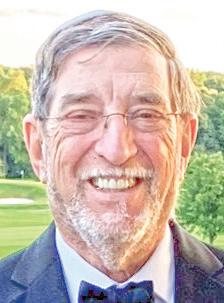
younger colleagues. As passionate as he was as a lawyer, nothing held more joy for Jim than his role as a father and grandfather. He was well-known for his sweet lullabies and imaginative bedtime stories. Jim is survived by his beloved wife, Meredith Moss Levinson (whom he met in kindergarten); his children Stephen (Hannah) of Oakwood, and Joel (Randi) Levinson of Loule, Portugal, his treasured grandchildren, Mortimer, Noah, Hubert, and Dahlia, his sistersin-law Rose Levinson and Phylis Walt and his nieces, nephews and cousins. Interment was at Riverview Cemetery. Please consider donations to the Dayton Chapter of Hadassah, P.O. Box 292815, Dayton, Ohio 45429. May his memory be a blessing to all who knew him.
Robert Seiden (aka Bob, Bobby) passed away surrounded by love on Dec. 10 at the age of 82. Bob was born on May 1, 1940 in Brooklyn to Fannie and Benjamin Seiden. Bob graduated from Samuel J. Tilden High School before serving as an Army Ranger in Vietnam. After returning from his service, he began his career in the sheet metal industry, eventually moving to Pittsburgh to become the president of SSM Industries, where he retired in 2006. In his retirement, Bob moved to Myrtle Beach where he started a small business, Bob’s Handyman Services, and played a lot of golf. It was in Myrtle Beach where he met his wife, Peggy Crawford Bowers, to whom he has been married for 12 years. A lifelong fan of the Brooklyn Dodgers — as well
as any team one of his grandchildren played for — he was also known by any of his golf partners for making up his own rules of the game! Bob had a long history of caring for others, starting when he was young and served as a camp counselor for children with cerebral palsy and continuing through his dedication and care of the love of his life, Irene, as she battled early onset dementia. He was preceded in death by his brother, Daniel Seiden, his sister and brotherin-law, Harriet Seiden Brotter and Marvin Brotter, and his beloved wife of 39 years, Irene Kozichousky Seiden. Bob is survived by his children, Karen and Lee Levitt, Brad Seiden, Rachel and Ed Fagan; and his grandchildren, Maddie (Reece), Kyle, Sammie, Marla, Sophie, and Noah; in addition to his bonus grandchildren, Trish, Connor, and Nick. He is also survived by his best friend and adventurer, Jerry Greenberg. Bob had no “in-laws,” he considered all of them “just family.” He was the original “funcle,” always good for a prank or a tickle. He will be greatly missed by his many nieces and nephews and their children. The family wishes to extend a special thank-you to his caregivers at NHC Health Care who took wonderful care of him throughout the last few months and Caris Hospice, who took gentle care of him though his last few days. Interment was at Wellwood Cemetery, where he will dance once again with Irene. Donations in his memory can be made through Carisma Hospice to one of many organizations that Bob supported: https://carishealthcare.com/donations/.
THE DAYTON JEWISH OBSERVER • FEBRUARY 2023 PAGE 27 Larry S. Glickler, Director Dayton’s ONLY Jewish Funeral Director 1849 Salem Avenue, Dayton, Ohio 45406-4927 (937) 278-4287 lgfuneralhome@gmail.com GLICKLER FUNERAL HOME & CREMATION SERVICE L’dor V’dor. From Generation To Generation. OBITUARIES North Main Chapel 1706 N. Main Street Huber Heights Chapel 5844 Old Troy Pike Pre-need Arrangements Pre-paid Funeral Trusts Cremation Services • Transfers Our Family Serving Your Family For More Than 90 Years For Both Locations Call 937-275-7434 Funeral Homes, Inc.






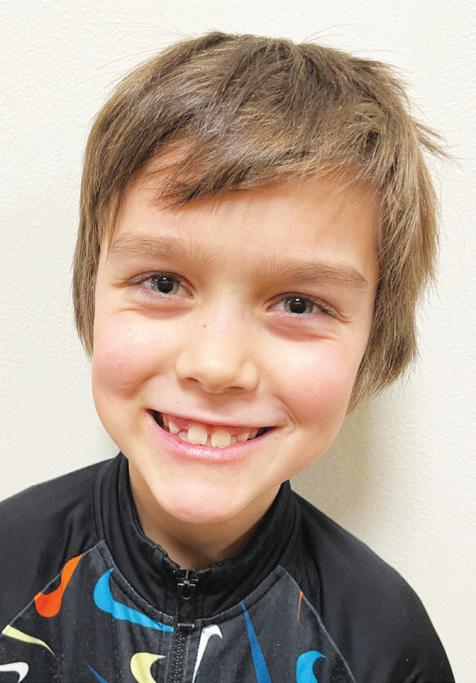


Return with payment to: The Dayton Jewish Observer, 525 Versailles Drive, Dayton, OH 45459 $100 Angel One-year subscription, acknowledgment in The Observer and one free three-column holiday greeting ($54 value) $18 Subscriber One-year subscription to The Observer and acknowledgment in The Observer ($18 value) $36 Double Chai One-year subscription, acknowledgment in The Observer and one free one-column holiday greeting ($30 value) If you love what we do, help us continue! BMB
Yes! I will support The Dayton Jewish Observer. Name Address City State Zip Phone E-mail (check one) I currently receive The Observer via mail: yes no Fill out your name exactly as you wish it to appear in The Observer Make checks payable to The Dayton Jewish Observer We can’t do it without you! Ad sales and Jewish Federation support only cover a portion of our expenses to bring you The Observer. Printing costs and postage go up. We need your help to ensure the depth of our coverage doesn’t go down. Please consider a Voluntary Subscription to The Dayton Jewish Observer. $250 Guardian Angel One-year subscription, one-year acknowledgment in The Observer and three free three-column holiday greetings ($126 value) $1,000 Champion All listed in Guardian Angel, plus the gratitude of knowing how much you help support Jewish journalism in the Miami Valley ($126 value) There’s a place for your child at Hillel Academy. • Exemplary secular and Judaic education • Art and science professional residencies • Project-based learning and critical thinking • Hebrew language immersion via Ulpan Or and Tal-Am curricula • Sinai Scholarships available to eligible new students Academically driven, culturally inspired for more than 60 years. Now accepting K-6 applications for the 2023-2024 school year. daytonhillel.org • 937.277.8966 • dkmecoli@daytonhillel.org
Observer mascot Bark Mitzvah Boy





















 By Marshall Weiss, The Observer
By Marshall Weiss, The Observer























































































 Ron Wynne, Instructor Curtis Estep, Instructor
Ron Wynne, Instructor Curtis Estep, Instructor



































































































































































































 Shannon Lindenauer, Events Director (937) 222-ARTS x105 • events@cultureworks org
Shannon Lindenauer, Events Director (937) 222-ARTS x105 • events@cultureworks org





























 By Susan Barocas, The Nosher
By Susan Barocas, The Nosher





 By Rodger Kamenetz
By Rodger Kamenetz






























